#where sometimes people would refer to them by the actor's name instead of the character
Text
i went to my movie class tonight and i brought my copia plushie and a girl i was chatting with asked me "is that tobias?" and i took so much psychic damage
#i don't know how to answer that in a way that doesn't reveal how devastatingly not normal about them i am#like it just made me mad#i just said it's c.ardinal c.opia and moved on#but like obviously she wouldn't know#but it was just kind of upsetting :/#like no. this is a plushie of my HUSBAND. this is not about tf fucking hell#i just sometimes get reminded that i enjoy ghost content in a way that is. atypical#like i had a similar issue when i had live action f/os in the past#where sometimes people would refer to them by the actor's name instead of the character#and it's just frustrating because that's not who i'm interested in. that's not who i love it's not about them#and with tf it's especially remarkable since even their appearances are different!#but still!#sorry this is just. a weird vent but it's irritating#what do you have to say doll?
3 notes
·
View notes
Note
Hiii! I was wondering about the label/term "human" in Twisted Wonderland and whether it seems to apply to beastmen and merfolk as well as the typical humans. I was thinking about Sebek and realized that I didn't know if he's ever referred to any of the beastmen or merfolk in the cast as "human", so I was wondering if you (or any of your followers) know of any such instances? Is it possible that "human" can be used to describe everyone who isn't fae? Like interchangeable with mortal?
Thank you so much for this question! I love your interpretation of Sebek's use of the word "human" correlating to "mortal," and you may be right!

Sebek referring to Azul as a human is a point in Malleus' Glorious Masquerade vignette: Azul compliments Malleus, so Sebek corrects himself to call Azul by name instead (even referring to him with the "-senpai" honorific) after he calls him human.

Sebek also calls Ruggie human during New Year's (removed from his EN dialogue), and calls Leona human during Malleus' dorm vignette.
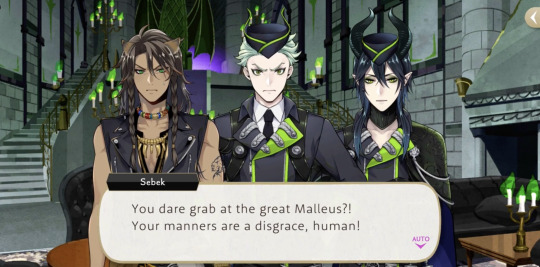
It is an interesting point that none of them ever correct him!

There is a scene during Spectral Soiree where a possessed Ace calls Floyd and Leona human. Floyd responds with "I know you are, but what am I?," as though insisting that he himself is not human, but this was a joke that was added to Floyd's EN dialogue.
In Floyd's actual dialogue in the original game he responds, "You're human, too," as though he considers himself to be as human as Ace.
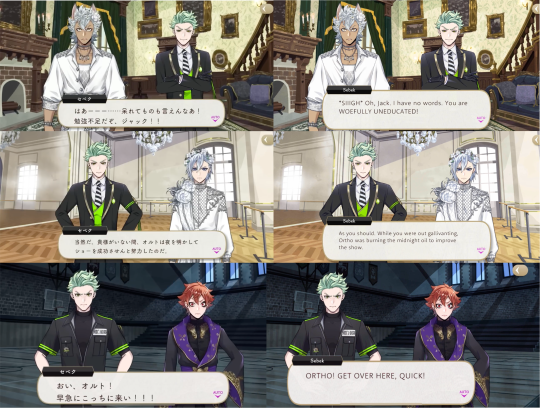
Returning to Sebek: he refers to both Jack and Ortho by their names during Fairy Gala IF, though he does address the group of the Prefect, Grim, Ace, Deuce, Epel, Jack and Ortho as "humans" collectively.

(I attended TwstFes last year and a part of the event that took place before the livestream began was a live reading of two scenes by all the voice actors, in character. Sebek and Ortho's VAs were in one of the two scenes together and Sebek's dialogue included him referring to Ortho, directly, as "human," but I am not sure if this can be considered canon to the game considering the circumstances.)


While Sebek is the most infamous of the cast for his use of the word "human" he is not the only one, with both Malleus and Lilia also referring to non-fae as humans.

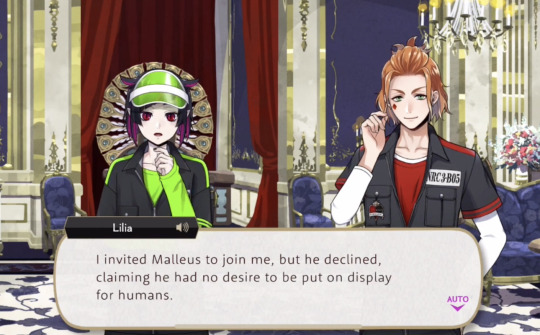

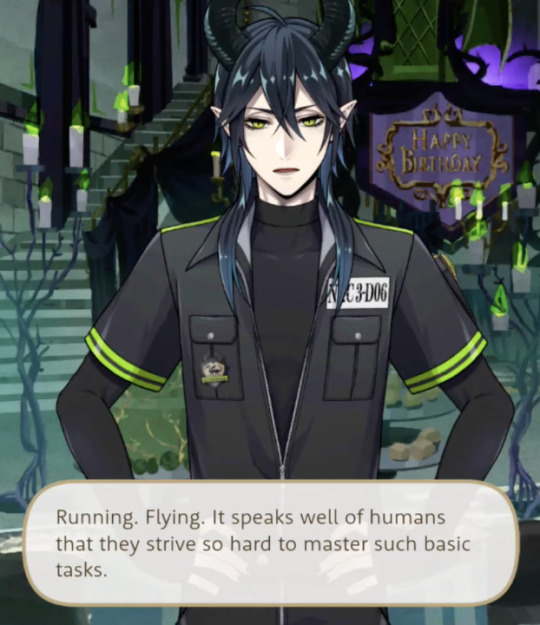
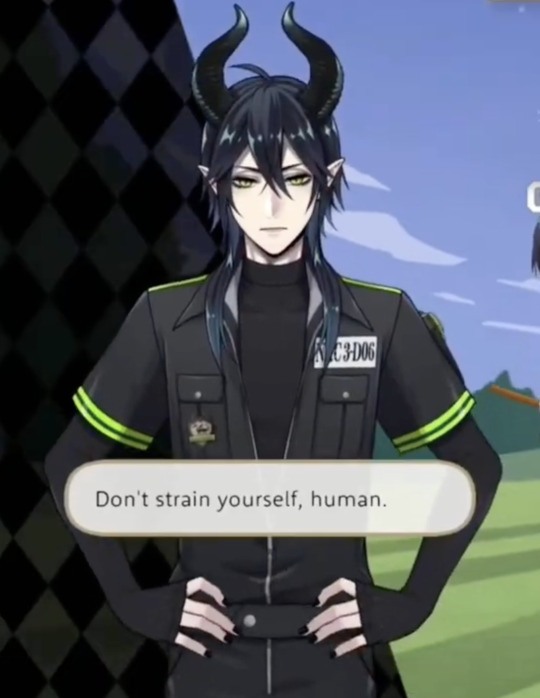
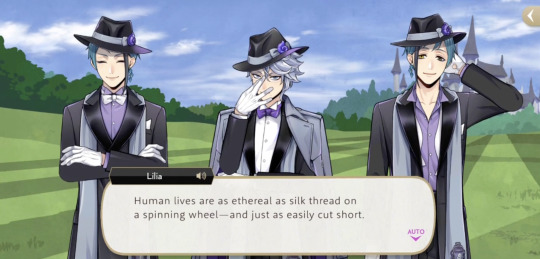

Malleus and Lilia will sometimes say "children of man" instead, but it seems that using that term might be a conscious decision that they make depending upon the situation (i.e., if the humans in question can hear them) rather than a natural form of expression.

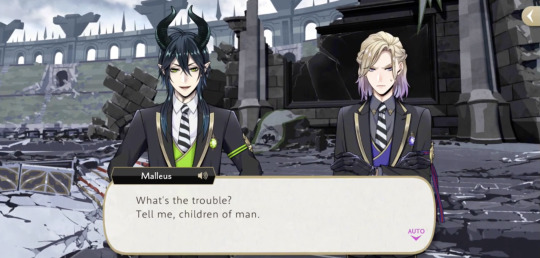
In Malleus' dorm vignette we have both characters referring to "humans and fae" as though those are the only two variations in this universe, which I think adds credit to your theory!
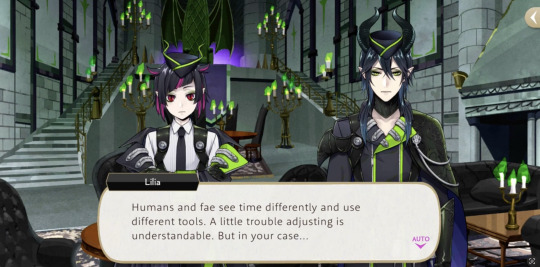
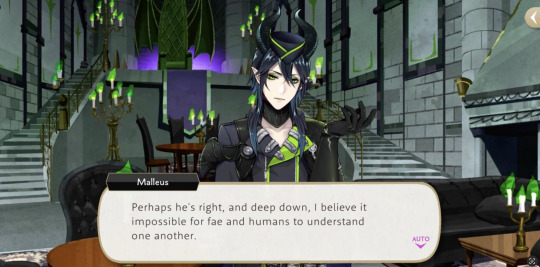

It is possible that they are using "humans" as shorthand for, "those who don't live as long as the rest of us," as you say! (and we don't yet know what the lifespan of a half-fae like Sebek might be, but presumably longer than that of a full-blooded human?)
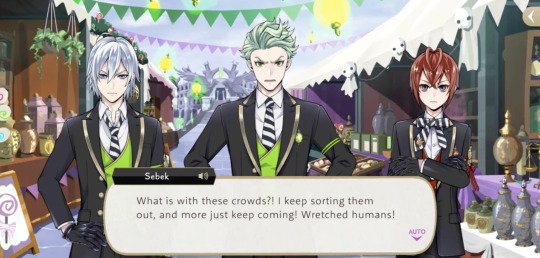

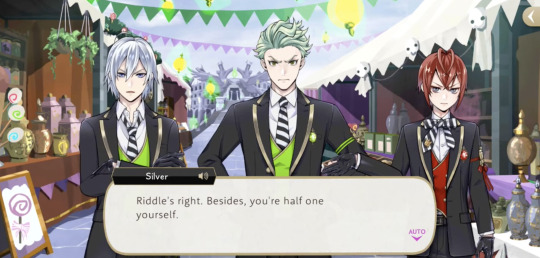
I found this very topic being discussed on a Twstsoku thread, where a similar conclusion was reached!
(Someone in the comments asks if beast-people are really considered human in the game despite how they are canonically the descendants of animals and someone responds, "humans are animals.")
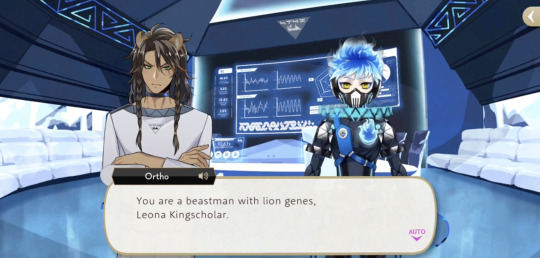
Am hoping to go into a proper deep-dive of this topic when putting together Malleus' and Lilia's character information sheets, but would certainly love to know if anyone else may know something that has been missed! :>
138 notes
·
View notes
Text
Skull-Face Bookseller Honda-San Review
There are two types of people in this world: those who love taking a trip to their local bookstore, and those who hate fun. I happen to be part of the former group, and try to visit my local Indigo at least once or twice a month just to check out what’s there. Sometimes, its just nice to wander through the aisles, and casually explore what’s there, without really looking for anything in particular. Its a place so laid back, it begs the question: ‘Working there can’t be that hard, can it?’
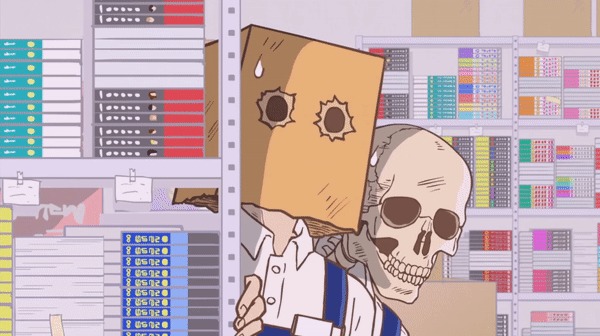
As it turns out, working at a bookstore is pretty complicated, something that I learned after watching this month’s assigned anime: Skull-Face Bookseller Honda-San. Based on the manga of the same name, this series follows a skeleton named Honda who works at a non-descript bookstore in Japan, stocking shelves and helping customers. Each day brings new challenges which Honda and his odd-headed co-workers must face, in wacky (sometimes barely animated) hijinks.

Skull-Face Bookseller (abbreviated to SFBH from now on for brevity) is a series whose main focus is being a ‘relatable’ workplace comedy. Folks like me who’ve never worked at a bookstore might find themselves getting confused at all the workplace lingo thrown around, though the series does a good job at explaining the concepts to the audience. The series, though, has this overall sense of expectancy over it, as if the creators are waiting in the bushes for you to laugh at their ‘relatable’ jokes. Every time a character complains about working too long, about how customers are rude, or how their job sucks, the anime expects you to relate that to your own working experience and therefore laugh along.

And yet, it always stops before it gets too pessimistic. Most shows that I’m familiar with about people with jobs go down this doom spiral, where characters obsessively complain about work. Their job sucks, something happens that they weren’t expecting, they react negatively, rinse and repeat. Here, though, the writer steps back right before the spiral begins, acknowledging the problem but refusing to let it control their life. SFBH is a refreshing take on the time-worn workplace comedy, because it doesn’t make the entire joke of the series ‘Working sucks’.

Instead, the main joke of the series is the appearance of the bookstore employees. Just like in the original manga, Honda and her co-workers are depicted as wearing unusual helmets or masks, giving them a sense of cartoonish silliness that separates them from the customers at first glance. I’m not exactly sure why they look like that (my guess is to protect the identities of the real people involved), but the weird faces has an added benefit beyond simple aesthetics. In a series that revolves around a large cast of recurring characters, confusion is inevitable, especially since some manga artists suffer from ‘Same Face Syndrome’ with their female characters. Since the main cast of SFBH are all wearing weird head-coverings, its easier to remember who is who, and every character looks distinct.

SFBH’s characters also fall into this weird grey area when it comes to gender recognition. Since most characters have their faces fully covered, our only traditional means of distinguishing are from dialogue. Nobody ever mentions the word ‘man’ or ‘woman’ (and knowing Japan, I’d be shocked if the concept of non-binary was even hinted at), but the occasional ‘him’ or ‘she’ is thrown around when referring to someone. The Japanese voice actors sound like what one might expect from a ‘she’ or a ‘he’, but when it comes to Honda, things get complicated.
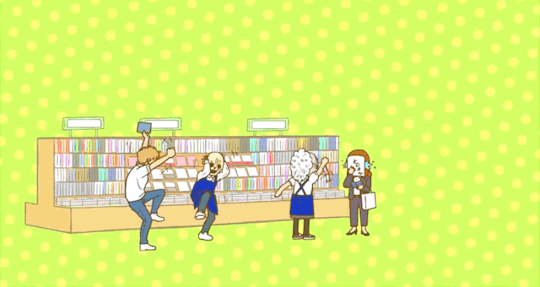
Honda is, of course, a skeleton, who lacks any stereotypically feminine or masculine traits. His face is plain, his bony frame is mostly hidden under a white shirt and blue work apron (and what would we even expect to be under there, besides bones?). By all accounts, Honda is pretty androgynous, something that isn’t too common in a series where that isn’t the main punchline.

What makes things interesting is how Honda herself identifies. In the anime, Honda is voiced by Soma Saito, who you might recognize as that green-haired wimp Tadashi from Haikyu. Because of this, Honda sounds very masculine, and the subtitles agree, referring to him as ‘he’ or ‘him’. At the same time, the character is intended to be representing the author, who identifies as female. There are a few times in the manga where Honda is read as female, including being referred to as an “older sister” type, or when a customer declines her offer to help carry a heavy bag because it would be ‘too heavy for a woman’.

Honda flip flops between being read as male or female, while showing no obvious signs of being either. The very beginning of the series has him lament about the typical image of a bookseller being a sweet, glasses-wearing young woman, and how he doesn’t fit that image. Yet, later in the series, when Honda talks with her manga editor about a live-action adaptation, they joke about which male actor they would cast as her. I’d like to believe that Honda is genderfluid, which would be groundbreaking for a Japanese manga, so it gets representation points in my books.

Beyond complicated gender identities, anyone who is even mildly versed in manga will get a kick out of this series for how often it references popular series. Characters will burst into a scene, asking if there’s more copies of a famous manga in stock, all the while the name is barely censored because of copyright. Well-known manga references are thrown all over the place, giving the fictional bookstore a greater sense of legitimacy. Instead of making obviously fake titles, they just said ‘screw it’ and used real ones, making it feel more real. While watching this anime, I found myself trying to identify all the manga mentioned by characters in dialogue, almost like a little game. Its pretty fun, if you know your stuff.

I’d also like to think that whoever recommended this series to me knows me really well, because the amount of references to yaoi or BL in this anime is shockingly high. The entire first episode is practically devoted to it, culminating in a scene where Honda has to deal with an English-speaking customer who is looking for an explicit doujinshi that his daughter wanted. I really don’t know what’s worse: the fact that a character mentioned a BL series vaguely in an off-hand comment and I immediately knew what it was (despite never having read it), or that I knew exactly which doujinshi the English-speaking dad was looking for. Let’s just say that I haven’t watched Gintama yet, but I have some experience with the main character...
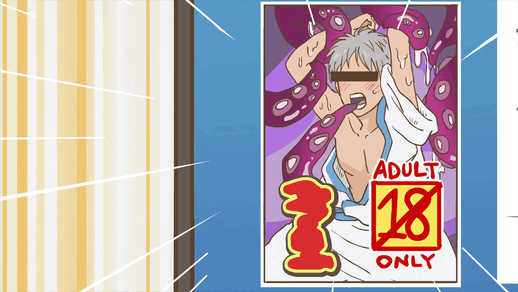
SFBH is a good anime: not great, not fantastic, but not bad either. It wasn’t trying to be some over the top, zany comedy, or some deep meditation about workplace culture. Its a short, snappy, and visually distinct series with it’s own sense of humor, one that relies more on weird people and situations than pessimism and ‘relatability’. I enjoyed how much it had to say about how bookstores work, and I felt like I learned while watching it. One thing’s for sure: I have a new sense of respect for bookstore workers, after seeing all the hard work that goes into keeping everything in order. Now, I can rest assured that when I bring my big stacks of plastic-wrapped BL to the counter, the employee ringing me up is just as embarrassed as I am. What a relief.

15 notes
·
View notes
Text
Author's Notes: Chapter 32 (The Man in the Picture)
Yay, another chapter with a short turnaround! Don't expect this trend to continue, as I have just enrolled in full time college again and am still getting used to it.
I was very cautious with the opening of Michelle in the changing room. That scene could get very, very creepy with the wrong prose, but I think I managed to make it more endearing than "male gazey."
Speaking of male gaze, Boney! Boney's back. My original plan for Chapter 31 was to end on the scene of Michelle seeing Boney in One Size Fits All, but I decided to change it in order to avoid feeling too similar to Chapter 18 (where the chapter ends with Michelle finding Boney's dead body on the plane). That worked out for the best, too, considering Chapter 31's length.
Reread the phone call Boney has with the Grand Marshal in Chapter 30; this is where he was sent to go. I think you should have an easier time filling in the blanks now.
Michelle having a panic attack and running away was one of the easiest I've ever written in my two years of Iron Touch. I don't know what that says about me.
Midler's back! Remember, High Priestess' user? No? Too bad. My original original outline called for Mariah here instead of Midler, and she would've walked with a gimp as a result of permanent damage she received from her fight with Joseph and Avdol. I changed this for a couple reasons: first of all, I would have had to rework/add onto Bastet in order for her to work in this arc, which I didn't think a lot of people would like. Also, Demonic Heartbreak used her already, so. Y'know. I think Midler fits better in Chicago IX as a SEES member anyways.
With that in mind, it should come as no surprise that Cascada wasn't a part of the original outline, either. High Priestess was originally going to be the "main" enemy Stand of this arc, but I changed that. I cannot stress enough that readers from Fanworks have been really rallying for more original Stands in Iron Touch. This is the best of both worlds—I get my canon characters and you get your OC. Hooray! I like Cascada and Moon River's aesthetics, if nothing else.
I did look it up and yes, bees are native to Egypt.
I feel like it should be pretty obvious what SEES is and how it works by now. If not, please let me know in some way and I can give a more detailed explanation in a future chapter.
In case you didn't know: a green room is an area backstage where actors wait for their cues to go onstage. I've heard different reasons for why they're called that; sometimes it's a simplified English pronunciation of a foreign word, other times it's because actors would throw up there, and I don't know which is accurate. They're not actually green. In smaller theaters (like an amphitheater), green rooms can double as hair and makeup rooms, like what we see here.
I feel like giving Moon River a mermaid theme is a bit of a cop out, but @simpingforcreamsoda said he really liked the design, so I hope you guys do too.
Music references:
Ok so I didn't originally intend for this to be a music reference, but there is a song called The Man in the Picture by The Bobkatz. I chose the title just based on it being a double reference to both Polnareff and Boney. But I listened to the song and I think it fits pretty well so I'm adding it to the playlist. Why not.
Cascada is named after a German dance music act of the same name. (I actually didn't know Cascada was German until now, the more you know)
Cascada's beta name was Moon River at one point, but that honestly did not last long. I'm trying to avoid making OCs with two word names, because having them be one word names is so much easier to write.
Moon River gets its name from a song originally sung by Audrey Hepburn for the movie Breakfast at Tiffany's. The song is so famous and has enough covers that I feel comfortable breaking my "no licensed music" rule (as in, no music originating from other media like video games or musicals) for it. The version I'm using on all the music reference playlists isn't the original Audrey Hepburn version, but rather the Andy Williams cover. I think that version specifically should give some insight as to why I chose this song. If you know, you know ;)
As a side note, "Tiffany Amphitheater" was named after Breakfast at Tiffany's.
Moon River's beta name was Hips Don't Lie, and the Stand's ability was going to be more tied to Cascada's dancing. As the ability changed, I changed the reference as well.
Not a music reference, but Midler's appearance here (specifically the buck teeth) were based off of Winifred Sanderson (played by Bette Midler) from the movie Hocus Pocus. IRL Midler has gone on record to say that this is her favorite film role of all time and she is the only reason that the sequel came out even remotely like it did, so I'm not just arbitrarily choosing a random movie reference here.
2 notes
·
View notes
Text

summary: the production of genshin impact is amazing! now let’s see what the actors are really like separate from their characters
style & genre: bulleted; modern!au, general fic
warnings: mentions of drinking
notes: another idea that’s popped into my head! this is pretty random but i’ll be updating more parts if you guys like it☺️

Aether and Lumine aren’t actually related in real life, they just look so much alike that they thought they were long lost siblings. Even off set they act like brother and sister because it feels natural after spending so much time together
Their phone contacts for each other are “my twin” and their greetings are always “i found you!”
Paimon uses a green suit to hide the lower half of her body but when she was getting used to “flying” around, she would forget that she didn’t actually fly and would step on other cast members’ toes: most of which were Aether’s
Bennett is the luckiest guy on set and actually pulled two five stars in a ten pull and hit 30 pulls to get another five star, however, he is really clumsy and trips over air every three seconds even if he watches where he walks
Diluc and Kaeya don’t hate each other but have a mutual rivalry over certain beverages. At one point they stopped talking to each other for a whole day because Diluc said the alcohol Kaeya brought him tasted cheap
Speaking of Diluc: he, Aether, and Albedo use the same brand of hair oil, only to realize when they sat next to each other and commented how familiar their “cologne” was
The drinking buddies (Kaeya, Beidou, Rosaria, Venti, Lisa, and Scaramouche) hang out on their days off sometimes
Klee really likes to be around Kaeya or Albedo because she thinks they’re good-looking. She gets excited when she’s in the same scene with either one of them so her personality is really genuine on screen
Albedo keeps chapstick in his pocket and uses it periodically between scenes. He zones out quite a lot because he gets bored easily. Yells at people to hydrate but in like a calming voice
Qiqi is already a pretty quiet kid but she likes to act and her role was perfect for her. You might see her sitting in the director’s chair when the cameras are rolling because they want her to see what she’s a part of. aw
Mona likes her hat and keeps it on most times but it always wacks people in the face when she turns. She doesn’t mind when it hits Scaramouche because he has his own hat. They have impromptu hat battles sometimes to which the costume designers get nervous about
Fischl can’t speak German for the life of her and she really likes Jojo’s and laughs in references with Razor. You might think she’s still in character off camera but no, that’s just her
Zhongli is possibly the richest person on the set but everyone else pays for all of his expenses just because. He does pay for everyone’s coffee especially when they have an early morning shoot
Scaramouche, Keqing, and Xiao have a group chat where they poke fun at other cast members showing up late and then proceeding to roast them behind their backs
They also like to change their lines in the middle of a shoot like Keqing ranting about the archons but instead she replaces them with other cast member’s names; Scaramouche replacing “when did i give you permission to issue your own orders” with “i’m hot aren’t i;” and Xiao repeatedly saying “can i eat something other than almond tofu please” or “i feel bad for this guy, he needs a hug” while looking straight into the camera
Xiao is actually a shy guy who is very kind to everyone around him so the cast was surprised when he started saying character lines because they never heard that tone in his voice before. He was mildly flustered afterwards from the compliments
Out of all the cast members, Aether forgets his lines the most even though he doesn’t say that much. When he forgets he autopilots to “windblade!”
The younger cast have a group chat to keep each other accountable for their early shooting times. But they all forget and end up late to the reading table
Signora actually did punch Venti in the stomach too hard on accident and they had to take a break as she apologized profusely to which Venti kept reassuring her that it was fine; got his gnosis back after the scene was over as symbolism for “i’m sorry i punched you in the gut really hard”
Barbara sings like an angel and the theme song for the series is written and sung by her
Childe stared at his prop bow for a good five minutes when he first got it and told the director that he didn’t prepare in using a bow but for “dual-wielding.” (plot twist: they never actually told him he was using a bow as a weapon but they knew he was a fast learner). All of the shots of him using it are genuine confusion as to how the thing works
One time with his last shot, he threw the bow on accident and hit Bennett
During the cast interviews, Venti likes to do them all with Zhongli or Xiao because they actually let him talk as much as he wants without overpowering his already loud voice
When he does it with Paimon, they tend to blow out the surrounding people’s eardrums so they were never paired again haha
Other interview pairings are Ningguang and Beidou and people like watching them together because of how soothing they sound and just the overall way they talk to each other
The opposite with Kaeya, Childe, and Lisa interviews. They keep flirting with the interviewers and viewers
“Hey girlies, watch the next episode” wInK
“Seize the day. Watch us again tomorrow night 8:30pm PST” wOnK
“What a cutie, would you like to see us again?” im blushing
Honestly, anyone could listen to Zhongli talk all day so he has longer interviews because even the people asking the questions want to keep him for longer
The whole cast is like one big family and whether they’re protagonists or not, they all have a close bond behind the scenes
#genshin impact#genshin impact headcannons#genshin impact imagines#genshin impact scenarios#genshin impact diluc#genshin impact kaeya#genshin impact childe#genshin impact zhongli#genshin impact xiao#genshin impact albedo#genshin impact venti#genshin impact aether#genshin impact scaramouche#genshin impact bennett#genshin impact lisa#genshin impact lumine#genshin impact ningguang#genshin impact beidou#genshin impact actor au#diluc#kaeya#albedo#childe#zhongli#venti#xiao#aether#lumine#scaramouche#bennett
992 notes
·
View notes
Note
I've gotta say, I find the concept of Bedlund trying to Ben-Hur Jensen absolutely hysterical. I'm just imagining Jensen getting a script and being like "Ben?? What's this? Is this gay? This seems gay????" and Ben just soothing him like a frightened horse.
Hahaha - Look it wouldn't be the first time.
What is this verb we're working with? Okay. Strap in everyone.
The Multi-Oscar-winning 1959 movie 'Ben Hur' had a bunch of gay subtext. The writer, the director, and the second lead actor all knew that Charlton Heston's character, Ben Hur, was gay. However, one person didn't find out until the 1990s: Charlton Heston.
The consensus on set was "Don’t tell Charlton, because he’ll freak out." and when Heston found out in the ninties, freak out was exactly what he did. (x) [the movie may have gotten a reference from Misha back in season 6 (x)]
Whether this happened with Jensen on SPN depends on two things.
Was the character of Dean intentionally written as Bi and, if so, at what point did that become true?
Did anyone tell Jensen? Did he figure it out? if so, when?
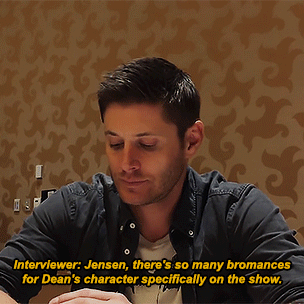
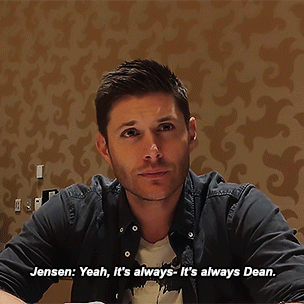
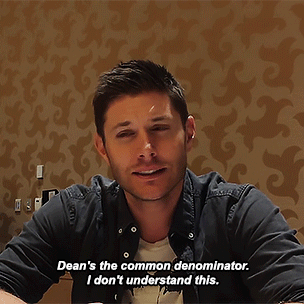
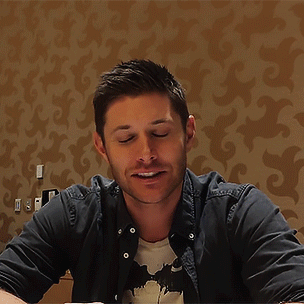
I personally DO believe at this point, I really do, that Bedlund - Ben Hur'd Jensen. I think it was part of the writers room but not all of it, until it was. (Which RN I believe finally happened under Dabb.)
I think Jensen wasn't in on it, until he was. So for me? I think he really was in the dark at one point. But at what point that changed? Probably only he can answer that question. and RN? He ain't talking.
In the meantime we can only look at things Jensen has said on the subject - Like this unbearably ambiguous GIF set from @nikadd.
Was this tongue in cheek? Legitimate ignorance?
You're killing me, Jensen. That cheeky lil smile, Jensen.
Nvm - I'm going to kill you instead. It's for my own survival.
No hard feelings right? You understand.
UH OH HERE COMES A CUT TO HIDE A LONG DERANGED POST...
We can look at the text for number 1 - and I do that uh - a lot - see the blog name #Dean Was Always Bi
For number 2 we can look over some points when we got clues from what Jensen thought was going on [regardless of whether they make sense based on his jacting or directorial choices I guess] and get left wondering whether at any point he felt pressured to lie for his career, for self protection, or to protect the narrative from the network:
2010 - 'We're missing the gay angel' (x) (Season 5 gag reel) (x)
“Sorry man, not what the show’s about.”
Jared: One of the good and bads about playing the straight
[non-comedic] character on the show…
Jensen: What wait? I’ve been playing him so wrong
2012 / S8 - Trenchcoat - Jensen talking about how sometimes they change the lines because they're way too gay.
Calls Cas a third brother
2012 - "What's Destiel?"
Ben Edlund: That’s some weird shit.
Jensen: Is this something that you created, Ben?
Ben: You don’t want any part of that.
“Don’t ruin it for everyone now” “I still don’t know what the question was. I’m going to pretend I don’t know what the question was.”
2013 @ JIB, re Dean’s reaction to Aaron’s flirting in the season 8 episode Everybody Hates Hitler, (x)
“And the scene wasn’t written to be that kind of - I mean - It was written to be awkward. Ben Edlund wrote the - my favorite line in that scene was ‘carry on . citizen’ that was - I almost couldn’t say that with a straight face I was laughing so hard. But it was - you know - it was comedy. It was a comedic moment in the show and fortunately Dean gets a lot of the comedic moments in the show and it was just, you know, Ben was poking fun at the fact that - you know, how can we make this very kind of manly, heterosexual guy uncomfortable - uh -you know, or or have him back on his heels and throw him off his game a little bit.”
The thing is - Bedlund and Phil Sgriccia made very clear on the commentary track that THEY saw this scene as a 'romantic comedy kind of fluster' "This potential for love in all places."
Ben Edlund calling the writer’s room a boy’s club in 2013 (x)
Misha Collins telling Destiel fans they aren’t Crazy in 2013 after some executives said they were (x).
2014 Jensen says he was glad there wasn’t much Dean and Cas in season 9 - HA Hah HAH (x)
“I think the whole Cas and Dean thing has gotten out of hand” “I don’t think there’s anything secret to their relationship even though a lot of people wish there was”
REMINDER - that season we got the nightstands acknowledgement and “play him like a jilted lover” and the “he dumped me James” cut and -
I certainly know that Misha and I don’t play that.
SIGH. they Ben Hur'd Jensen.
2014 - the fan fiction joke - 10.05
“I didn’t have a positive reaction, The first time in I think 200 scripts I went and sat down in the showrunners office and said, ‘What in god’s name are you doing?! Why? I need to understand why this is happening.’” “[Carver] gave very eloquent answers and did a great job of explaining why we were doing what we were doing, I guess I had been aware of this ‘fan fiction’ for a while and I felt like maybe if I ignored it, it would eventually go away. When I read it in the script that is what I do for a living and is my work—I’m very protective of these characters and the story and I think we have a right to be—I wasn’t angry. I just wanted to understand why and what was the message we were ultimately sending with this script and story. By the end of it, I felt good and it gave me all the confidence I needed. It was better than I could have ever hoped.”
But then there's Jensen in 2015 talking about all of Dean’s bromances. (x) [gifs at the top]
Could go either way - starting to figure it out? or No?
What had changed if anything? the entire Crowely season 10 story line? This was July 2015 - the same day as the SDCC 2015 panel where Misha talked about Destiel (x @ 13)
Carver and Dabb were there -
By this time Jensen and Misha were nominated for a teen choice award for best chemistry against various tv couples (and one ensemble cast, but the award nomination did NOT include Jared) .... Misha and Jensen would go on to WIN this award one month after the panel.
At the Panel Rob and Rich ask the question: “You two have branded yourselves as TV’s greatest team since, ... idk who.... Ernie and Bert so.”
[Misha says to Jensen & Jared, half not on the microphone: “I really didn’t expect them to throw us under the bus.”]
“are we going to see that continue? Is the Castiel Dean relationship still aflutter and still growing as we move into season 11?”
Jeremy Carver: “Ish.” [mocking from panel ensues] “Yes. Of course. I mean Yeah. Absolutely. Yeah. There’s no doubt.”
Jensen Directs 11x03 and the choreo mimics Goodbye stranger (x)
2016 - Jensen: Dean could have a huntress, but you’d kill her.
Jan 2017 Con the infamous - no hedge - harsh - “Destiel doesn’t exist.” (x)
I would hope that if he knew he wouldn’t have been so harsh with it. So by that point either he still didn’t know - OR - to him ‘Destiel’ was specifically about internet porn/sex and not like - the potential for feelings / a relationship.
It makes me think about something Misha had actually said, around 2013, “It’s called ‘Destiel’ and it’s about the romantic interludes between Dean and Castiel.” (x)
2017 - jib8 Jensen called Dean a lover of the ladies
May 2017 - After filming the end of season 12:
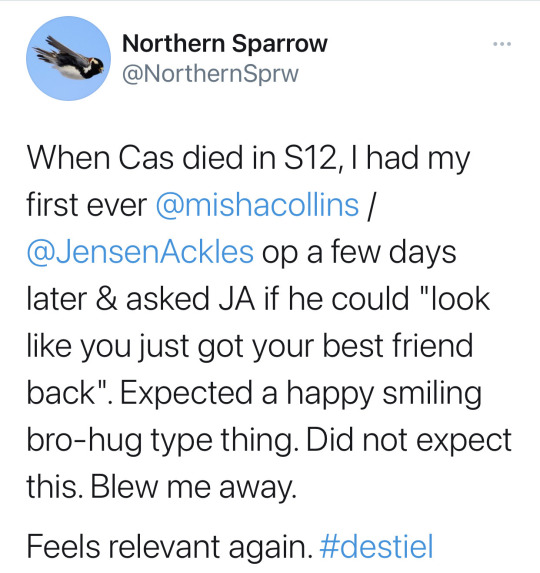
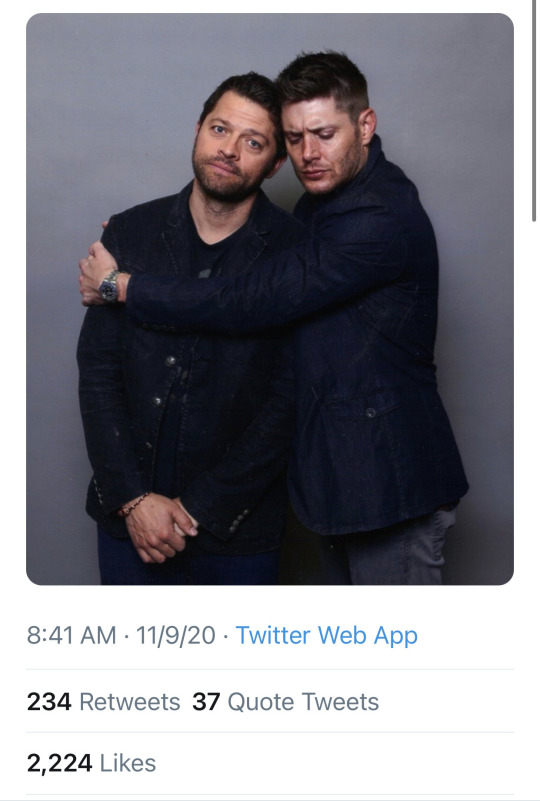
2018 - Misha confirms he and Jensen have talked about Destiel (x)
- also 2018: The Bisexual Dean essay "? No."
(Oh god was this really this recent?! I can't deal with this.)
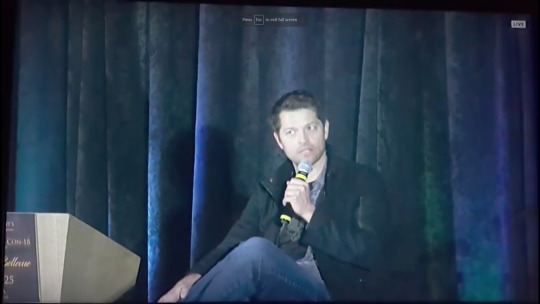
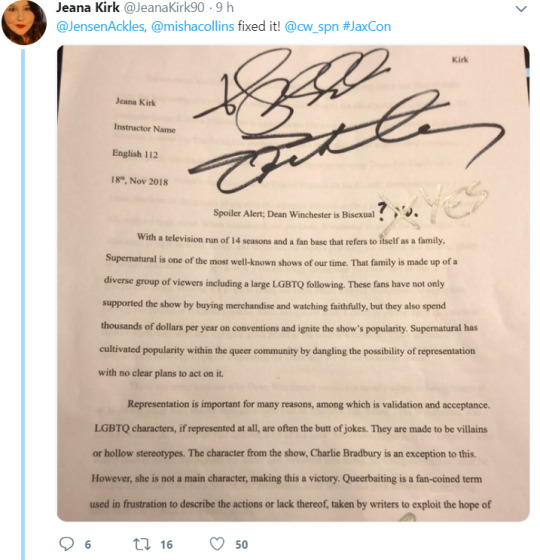
Well. SOMETHING happened in 2019. cuz here it comes
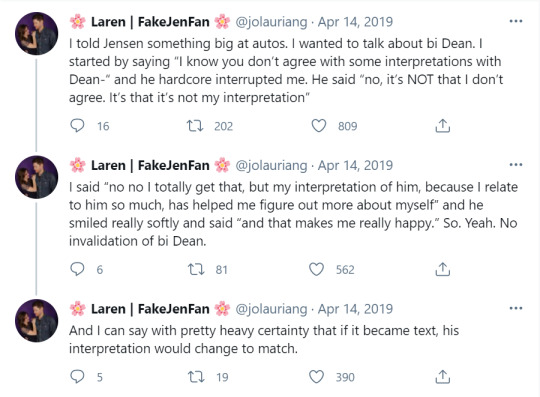
2019 - "Dean has no taste, clearly."
2019 - 'So, tell us just a little bit about what you're most excited to tackle with your character this final season.'
"Cas. Just like a full football form tackle."
Look at this face he gave Dean when Cas told him he loved him and tell me he wasn't playing into it here. You can't. (x)
#jackles long con#unparalled media experience#desticule#dean is bi#spn tinhatting#ben hur treatment#dean was always bi#jackles sexy silence#jensen ackles#spn meta#spngate#spn bts#spn behind the scenes#ben edlund#ben hur#bedlund#spn metacanon#i went off#I really do believe that bedlund ben hur'd Jensen#spn gaslighting#JENSEN WHAT THE ACTUAL HELL#my asks#caslighting#original content#long post#this has been stewing for a long time#reference#oh do help me this is somehting other people know way more about.#deranged#spn homophobia
265 notes
·
View notes
Text
Free Guy Review
!!!SPOILERS AHEAD!!!
If you haven’t seen the movie Free Guy (2021) stop reading right now! Drop what you’re doing and go get yourself a ticket! You’ll thank me later!
I loved this movie! I saw it this weekend for the second time because it’s that good! I first saw the trailer on YouTube a while back and then when theatres reopened a few weeks ago I saw the trailer again and my interest was piqued. I had high hopes for this movie based on the fun looking trailer, the premise, the cast, and the sense of fun and escapism that the movie seemed to embody and it did not disappoint. It’s always nice when you have high hopes for something and it meets or exceeds your expectations.
Free Guy is just such a fun and joyous movie. Never taking itself too seriously, packed with lots of heart, cool cameos, full of gaming and pop culture references, and it’s fueled by a unique concept that is well executed. There are just so many things I loved about this movie! It was a ton of fun to watch and the actors clearly had a blast making it. During the movie I kept trying to figure out where I knew most of the actors from but couldn’t place them. When I got home, I googled it and I instantly realized why. The roles are just so different and the actors embody their characters so completely you lose yourself in the film and get completely sucked in.
I was honestly so surprised when I figured out what I knew most of the actors from because the roles that they’re known for are so different from their characters in the movie. Their appearances, established ages, and even the accents are so different that I literally did a double take, but that’s what makes the movie so good! Because the main actors obviously didn’t need the paycheque they were just there to have fun and it shows. I think if the situation had been different and the actors involved had been desperate for money or took the role for some other reason it wouldn’t have worked. The film would have come off as cheesy, forced, cringeworthy, or just plain bad. Free Guy is none of those things.
The film stars Ryan Reynolds as ‘Guy’ a bank teller in a video game called Free City, Jodie Comer whose best known for playing Villanelle in Killing Eve as programmer Millie Rusk and her avatar Molotov Girl, Joe Keery whose best known for playing Steve Harrington in Stranger Things as programmer Walter ‘Keys’ McKey, and Taika Waititi whose best known for playing Viago in What We Do in the Shadows as the Head of Soonami Studios and the film’s main antagonist and villain Antwan. Rounding out the cast are Utkarsh Ambudka as programmer Mouser and Lil Rel Howery as Guy’s best friend and bank security guard Buddy.
In a nutshell, Free Guy is about a bank teller named Guy who finds out he’s a non-playable background character (NPC) in an open-world Grand Theft Auto style video game called Free City. Guy becomes the hero of his own story after meeting Millie, the girl of his dreams, and winning fans all over the world by racking up points by being the good guy and helping others. After leveling up and helping Millie escape a dangerous situation in the game, Guy wins her over and she falls for him thinking that he’s another player. But when the world that Guy knows and all of the people in it are threatened, he teams up with Millie to save his friends before it’s too late. In the real world, Millie enlists the help of her former programming partner and best friend Keys in a race against time to stop their code and all of the sentient characters from Free City from being deleted by Antwan the developer who stole their code when the game’s sequel launches.
I love that the movie had a unique premise and didn’t overcomplicate things. There are so many movies that I’ve gone to see over the last few years with such excitement only to be disappointed. For example, I loved Wreck It Ralph, but was so disappointed by its sequel Ralph Breaks the Internet. The trailers made it seem like it would take the premise of the first movie and move things into the online gaming world, and I was excited for that. Instead, the sequel left the premise of the first movie behind entirely and way over complicated the plot and the end result was extremely cheesy and disappointing.
Free Guy’s strength is that it’s a self-aware movie made by self-aware people who are excellent at what they do. The movie doesn't take itself too seriously, nor should it, and that allows the story to flow and the characters to feel real and genuine. The movie achieves that perfect balance between being entertaining and telling a cohesive and important story because while the movie never takes itself too seriously the people behind it are serious about what they do. This was very clearly a passion project for all involved, especially Ryan Reynolds, and it shows!
As he’s spoken about in interviews and on Twitter, Reynolds called on a lot of his friends to be in Free Guy and help him out and the end result was fantastic! I loved all of the cameos! The Chris Evans cameo was by far the funniest and the Alex Trebek cameo got me right in the feels. When I saw the movie in theatres me and everyone else in the theatre gave a collective “awww” when he appeared on screen.
Enlisting real YouTubers to show up as fictional versions of themselves to talk about Blue Shirt Guy’s popularity was a nice touch and you’ve also got blink and you miss it voice cameos by John Krasinski, Dwyane The Rock Johnson, Hugh Jackman, and Tina Fey. Channing Tatum appears as the avatar of player Revenjamin Buttons which for the most part was hilarious. One of my few criticisms of the film is that they went a bit overboard the avatar’s antics as Guy and Buddy are attempting to leave and it got bit a cringeworthy. But I know other people found it hilarious so to each their own.
I love all of the little details and references in the movie. Just listing them all would be a post in itself. If you’re someone that loves pop culture references and Easter Eggs this is the movie for you. The characters are fun and believable, and you get attached to them quickly. The actors commit completely to their roles which is makes the humour, romance, and heartfelt emotion of the film work. You buy it. 100%. Something that I absolutely loved was that the characters felt realistic and that the dialogue, attire, and settings for each character really felt authentic. I can’t tell you how many times I’ve watched a movie or TV show and walked away thinking, “The person who wrote that clearly never meet a kid, teenager, or twenty something in their life! That was so unrealistic.”
The slang’s all wrong. The dialogue is so eloquent everyone sounds like they did Shakespeare in the Park last summer. You walk away thinking, “What the hell was that? No one talks that way!” What I loved about the characters in Free Guy is that they felt like real people you could actually run into or walk past on the street. I’ve read in interviews that in addition to the written dialogue the cast did a lot of ad-libbing and improvisation and the end result is both hilarious and relatable. The dialogue feels real because it is. The big exception to this of course is Antwan who is altogether off the wall and ridiculous.
Antwan is such an outrageous, absurd, vulgar, and cartoonish character. He’s so fun to watch and the actors clearly had a lot of fun with his scenes! I’ve read that a lot of his lines with Keys and Mouser were improvised and I believe it. When he goes all Jack Nicholson on the servers? Lord. He’s such a great villain to watch. The characters that are established to be in their twenties like Millie, Keys, Mouser, and the other employees at Soonami Studios talk, act, and dress like they’re in their twenties.
The actors that are in their forties are styled to look like they’re in their thirties and honestly, they’re in such great shape it works! I mean I was honestly shocked to find out Taika Waititi’s real age. I love how the costuming really fits each character and allows you to learn more about them. Keys’ clothing is your typical gamer chic which makes because as we learn from his interview with Millie coding is his life and what gets him up in the morning. From Mouser’s clothing we learn that he’s a sports fan, but also isn’t afraid to take risks like with that blazer ensemble he wears in his final scene at Millie’s apartment.
Millie’s clothing shows the contrast between her and her avatar Molotov Girl, and Antwan’s ridiculous coat enhances the overall wackiness of his character. Guy’s clothing tells us something too. He wears the same thing every day until he meets Millie in the game at which point, he starts deviated from his Free City programming and chooses a different blue shirt. I also really love that they put thought into why Keys needs to wear glasses. Something I noticed on rewatch is that Keys is far sighted which is why he has his glasses on when he’s looking at his laptop or computer and sometimes when’s talking to other people, but not when he goes to see Millie at her apartment or when he goes to get them coffee at the end of the movie.
Another interesting aspect of Keys’ character that I noticed on rewatch is self-confidence is really something he struggles with in contrast to Millie and Mouser who are very confident. Millie is a genius programmer and Mouser is excellent at what he does, and they are both very confident in their coding abilities, but Keys isn’t despite being every bit the genius that Millie is. At the beginning of the movie when they first notice the issue with Guy Mouser jokes that Keys needs to be better at his job. In response Keys meekly says he thinks he’s pretty good at his job and trails off at the end. Mouser is just joking around, but because Keys lacks self-confidence comments like that hit him hard.
Mouser is moving towards his own desk as he talks so he doesn’t notice how self-deprecating and uneasy Keys’ response is. In the interview from the indie games conference that Millie plays for Keys at his apartment, he brushes off the interviewers comment that he’s a genius and says Millie is the real genius because she created the AI engine and he just wrote the code to make it work. Later on, when Keys helps Millie get into the stash house, she calls him a genius and he tells her that as he’s currently sitting on a toilet stealing user code he doesn’t exactly feel like one. Millie responds offhandedly that he never does, but luckily, she knows better.
When Keys realizes that Millie was right, and that Antwan did steal their code and their game worked he tells Millie they need to celebrate because once everyone sees their build she’ll be celebrated and she could win a noble prize. Both Millie and Keys are geniuses in their own right. The game wouldn’t have worked without both of their skills and Guy wouldn’t have come to life without both of them working together. Millie’s AI engine made his sentience possible, but Keys is the one who gave him hopes and dreams so that when he met Millie in the game, he came alive.
When done right the settings we see tell the story just as much as the characters do and I love how realistic the settings in Free Guy look. The floor at Soonami Studios where Keys and Mouser work looks like a real office and I love that the desks have clutter and personal effects on them like real cubicles do and that they show Keys taking a box of his stuff with him as he leaves. The lobby with the moving water videos and Antwan’s massive but largely empty office fits perfectly with the obnoxious, zany, and over the top character that he is. I also love the contrast between Keys and Millie’s apartments and how those settings tell us a lot about each character and where they are in their lives when the film starts.
When Keys comes home from work to find that Millie has broken in, we see that he lives in a stylish one bedroom apartment with an open concept kitchen full of stainless steel appliances, a large living room centred around an expensive wall mounted TV and entertainment system, with his computer and gaming station set up in the corner. On the walls we see artful clusters of black picture frames, through a partially open door we see a bedroom off to the side, the apartment is full of black and white furniture including a plush couch and nice lamps, and features a textured silver accent wall.
All of which makes the fact that Millie managed to break in even more impressive because it is clearly an expensive apartment in a nice building. Keys’ style is minimalist and upper scale and based on what we learn about the events that took place before the start of the movie this indicates that Keys got the apartment and all of the nice stuff in it using the money he received when Antwan bought his and Millie’s game. In contrast, Millie lives in a bachelor apartment and spends her time in coffee shops ordering one single black coffee over four hours. This tells us that she kept her original apartment that she had from before the game was sold and is living off the money she got from the sale while she spends all of her time trying to find the proof she needs to win her lawsuit.
When we see Millie’s place, we find that it’s cozy, full of plants, throw rugs, quilts, and comfy furniture. She’s got a bike in the corner, you can see her bed from the centre of the room where she’s got her computer and gaming station set up adjacent to the coffee table and the rest of the living room furniture. Her kitchen is smaller and full of wooden cabinets and her bathroom door has DIY multicoloured square panels on it. Keys and Millie’s apartments are very different and through these settings we see the contrast between where these characters are in their lives, their wealth, and their personal style.
The song ‘Fantasy’ by Mariah Carey is featured heavily in the film and is guaranteed to get stuck in your head in the best way! Jodie Comer’s cover of it is amazing! It fits the moment where Guy makes it to the island that is Millie and Keys’ original build and shows it to the world perfectly. This movie made me appreciate Mariah Carey’s music in a whole new way and I can’t be the only way. After watching the movie, I went looking for the song on Apple Music, wound up listening to the Mariah Carey Essentials Playlist, and I’ve become obsessed. I knew some of her hits, but after listening to her music more I get why people love her so much. Her five octave vocal range is amazing, and her music is just so fun to listen to.
The film has a really great soundtrack overall and I’ve had many of its song on repeat since I saw it. Something I really loved about this movie and the reveal at the end that Keys is in love with Millie and is desperate for her to notice, but she’s been oblivious the whole time is that they don’t do the supposedly nice nerdy guy whose really a jerk trope. So many movies do this where you have a nerdy male character whose unluckily love, looked over, or his love is unrequited, and we’re supposed to root for him because he’s a quote “nice guy”. But really, he’s not. He’s a jerk who feels slighted because a woman in his life doesn’t love him back or notice him and he feels as if she owes him something.
The scene at Millie’s place where Millie tells Keys he looks cute when he brags, and Mouser encourages him to tell Millie how he feels is super frustrating to watch but it’s so important to Keys’ character. He asks Millie out for coffee and when she turns him down to jump back into the game, he doesn’t make a big deal about it even though Mouser wants him to. Instead he gets up and goes and gets her a coffee anyway. She goes to tell him her order, oblivious to the fact that he’s memorized it, he tells her he remembers, and goes to get the coffee anyway much to Mouser’s and the audience’s dismay.
This is big because Keys clearly doesn’t want to be walking down the street by himself to get coffee. He wants to be getting coffee with Millie so that he can tell her how he feels to see if she might feel the same way, but when she turns him down he goes and gets the coffee anyway because he truly loves and cares about her and he values their friendship enough to put his own feelings aside and suffer in silence rather than lose her and what they’ve built. So, he takes the opportunity to get some air rather than continue to sit there in disappointment.
Which is why he’s so confused when Millie runs after him and calls out to him from across the street. He doesn’t understand what she’s doing there. She turned down his offer to get a coffee and he already knows her order so why is she there? I love that they chose to make that scene non-verbal. I think if Millie had come out and made some big declaration of love it would have felt cheesy and overdone. But her running after him and silently communicating through her smile and body language that she understood and that she felt the same way was perfect. It was subtle and beautiful and perfectly acted.
It also felt realistic to the characters because in real life when you’ve known someone a really long time and you’ve spent a lot of time with them you don’t always need words to convey what you mean. What Millie wanted to express in that scene was so big and so all-encompassing she couldn’t find the words to say everything that she wanted to say so she didn’t. She just stood there and smiled knowing that being the genius that he is he would understand. It’s like Keys says in their interview, words will fail you, but code never does.
His coding worked and now she understands so rather than try and say it all and fail she just looks at him and smiles to show him that she finally gets it. She finally understands what he’s been trying to say to her all this time. And you can see the exact moment Keys realizes why she’s there. The moment where he goes from being confused as to what she wants to realizing that she saw the video and she knows how he feels and that she wouldn’t be standing there smiling at him like that if she didn’t feel the same way.
When I watched the scene the first time around, I was anxiously clutching my nachos the entire time because when Keys ran towards her my immediate thought was, “Oh my god he’s gonna get hit by a car and they’re never gonna get to be together! Oh my god!” But then he didn’t get hit by a car and Millie ran out to meet him and for the first time in their relationship she met him halfway and they kissed and it was beautiful! I think because Free City had so much violence in it that’s where my mind went and I’m very glad they didn’t go that route.
One of my only criticisms about the movie is that I wish they had stayed on Millie and Keys just a little bit longer. They kiss and embrace and then very quickly they cut to black. I wish they’d linger on that moment just a little bit longer because I love those characters so much and in the scene that follows where Guy and Buddy are reunited we see them hug and then walk away together to start their new lives and I wish we’d gotten just a bit more time with Millie and Keys. I also really loved the parallel between the different kinds of relationships within the movie and how platonic relationships are just as important as romantic ones.
The reveal at the end about Guy being Keys’ creation and a love letter to Millie and her realizing she’s been loving Keys vicariously through Guy and them finally coming together and being on the same page is beautiful because from the very beginning the movie is full of clues, hints, and foreshadowing that all comes together at the end. Meanwhile, we see the friendship between Guy and Buddy and how important that friendship is to him because it’s something that he created on his own. His love for Millie is born out of the programming that Keys gave him, but his friendship with Buddy is something that Guy created all on his own of his own volition.
Which is part of what makes Buddy’s death on the bridge so tragic. I cried when Buddy disappeared. Reynolds and Howery play their characters with such sincerity that his death pacts an emotional punch you don’t expect. I love that the security guards at Soonami are so moved by Buddy’s heroism and are so captivated by what’s happening with the live stream that Millie is able to sneak past them into the server room and stop Antwan from destroying what’s left of the game. Something else I noticed on rewatch is that during the final battle after Millie gets booted from the game and Guy has to fight Dude on his own the glasses he’s wearing are very similar to the ones Keys wears in the movie which I thought was a cool nod to Guy being Keys’ creation.
This really is a movie in which you find something new every time you watch it. For instance, the second time around I noticed that the foreshadowing that Keys is in love with Millie, but she’s oblivious to it because she’s so focused on the game was really well done. In the video from the indie game conference that Millie plays for Keys at his apartment when asked by the interviewer about their chemistry Millie responds first and says that their friends, their relationship is completely platonic, and laughs off the idea that they have chemistry. In contrast Keys falters and is silent and then eventually says meekly that they’re just friends. Millie is looking ahead at the interviewer and to the side away from Keys as she’s laughing and so she doesn’t see Keys’ reaction.
At the end of the apartment scene after Millie breaks in to ask Keys for his help, he tells Millie he cares about her and he almost says something else. It feels like he’s about to say, ‘I love you’ but then he catches himself and instead tells her that she needs to leave. When Keys visits Millie’s apartment to tell her that she was right and they’re sitting on the couch he reaches out and puts his hand on her knee and then snatches it back when he realizes he’s gotten too close. He wants so desperately to be closer to her and in his excitement, he gets closer than he normally would before realizing that putting his hand on her knee in that close proximity is not a platonic gesture.
Millie is so caught up in the realization that Guy, the person she’s fallen in love with, is an AI and not a real person that she doesn’t notice. My heart broke for Keys in that scene as he realized that Millie had fallen for Guy and kissed him and was so upset about it and meanwhile, he was right in front of her desperate for her to see how much he cares. It must have just wrecked him to go home that night and realize that Guy was based on the lovelorn character he created and that Millie had fallen in love with his creation while at the same time being so oblivious to his real world affection for her.
In the scene at Millie’s apartment after they’ve gotten the server from Antwan and Mouser encourages Keys to say something, I noticed on rewatch just how weak and meager Keys’ attempt to ask Millie out is. He stumbles his way through asking her to get a coffee and trails off at the end so it’s no wonder Millie doesn’t clue in that he’s trying to ask her out. And in Keys’ defence he sent her a whole video confessing his feelings for her and all of the little things he loves about her and then told her to watch it and he has no idea if she did or not. We the audience know that Millie only saw half of it, but Keys has no idea if she saw none of it, part of it, or all of it. He knows she got Guy to remember, but she’s also sending him mixed messages.
One minute she’s saying he’s cute when he brags and the next, she’s turning him down for coffee to talk to Guy. From the outside it’s so obvious that Keys is in love with Millie, but she doesn’t see it because she’s always looking the other way, not paying attention, so caught up in the game, and too focused on their work to see what’s right in front of her. On rewatch one of the big things I noticed is that Keys is always on the edge of telling Millie how he really feels but he always stops himself because she brushes him or the idea off and because he’s scared of what will become of their work and their friendship if she doesn’t feel the same way. It’s a huge leap. If Millie doesn’t feel the same way it’s going to make their relationship incredibly awkward and could potentially destroy their partnership so Keys decides it’s better not to say anything or only hint at how he feels rather than run the risk of ruining everything.
Something else I noticed on rewatch is that in the interview they give Keys says he thinks of himself as an author and that code is what gets him up in the morning and that he loves the ones and zeros of binary because words can fail you and let you down but code never does. At the end of the movie when Millie goes to talk to Guy in Free Life he tells her that he loves her and while he knows that’s his programming he’s realized that he’s a love letter to her and that somewhere out there in the real world is the author. Such a great callback.
All in all, I can definitely say that Free Guy has been my favourite movie so far this year! Definitely my favourite movie of the summer. I went to see it twice in theatres and I’ve never done that for any other movie before. I’ll rewatch them at home sure, but I’ve never actually paid money to see something twice on my own. I’m very excited to see the sequel and my hope is that it will be just as good as the first.
Until next time.
#free guy#free guy movie#free guy spoilers#review#Thoughts#critique#millie rusk#Walter keys Mckey#walter mckey#guy#free guy keys#buddy#antwan#mouser#ryan reynolds#Jodie comer#joe keery#taika waititi#lil rel howery#Utkarsh Ambudka#alex trebek#jeopardy#mariah carey#fantasy#it's so good#go see it
99 notes
·
View notes
Text
i have opinions about The Prince of Egypt musical adaption and you’re going to listen to them: An Essay
So, quick disclaimer: The Prince of Egypt is one of my favourite movies of all time. The casting, the music, the animation, I think it’s one of the top-tier movies that have ever been made. I went into seeing the London West End production of PoE with a full expectation that nothing I saw on stage would ever live up to how much I love the movie. I was fully aware there are plenty of limitations to what can be shown live on a stage with human actors and props.
That being said, I was enormously disappointed with how the whole thing was handled.
The Good
Now before I launch into a whole tirade of what I didn’t like about the production, it does behoove me to say what I think they did do well.
The casting of the role of Moses was done fantastically, as was Miriam, Tzipporah, and Yocheved. The swings and the ensemble were really engaged and well placed, going through lots of quick changes to go from Hebrews to Egyptians to Midianites and back.
The two Egyptian queens, wifes of Seti and Ramses, are actually given names, lines, and character beyond being simply tacked onto their respective kings. We get to see how they feel about the events happening around them, and there’s even a scene where Ramses meets his wife and courts her, whereas in the movie, she stands in the background and says nothing. This is one of the areas I was hoping the musical, which would naturally have a longer run-time, would expand on, and I was pleased to see the opportunity was taken.
Light projections on enormous curtains were used to very good effect, taking us instantly inside the walls of the palace and then out to the desert.
Over all, the work was really put in to be engaging and emotional, and the orchestra really worked to deliver the right musical beats.
One of two stand out scenes as being done very well was the opening “Deliver Us”, which included a bone-chilling moment of Egyptians separating a mother and her baby, with her screams as she’s dragged off-stage, and the blood on the guard’s sword. It really brings home the fear as Yocheved tries to lead Aaron and Miriam to the river with her, not to mention Yocheved’s actress nailed the lullaby.
The second was at the other end of the show, “When You Believe” was beautifully performed by the whole cast, though it was somewhat stunted by what came before...
The Bad
Oh boy.
So the main problem with this show is not the music, not the staging, not even that sometimes the ensemble was a little off-beat (the lai-lai-lai section in Though Heaven’s Eyes comes to mind). Any mistakes there can all be forgiven, since sometimes things just happen in live performance, someone’s a bit off or something’s just not possible to do on the budget allotted.
The problem is in the script.
The Prince of Egypt movie is a story that stands not only on the shoulders of its fantastic music and visuals, but also on its emotive retelling and portrayal of the characters within - mainly Moses and Ramses. And while the stage musical does spend a lot of time with the two mains, it neglects two other, incredibly important characters.
Pharaoh Seti, and God.
In the movie, Seti strikes an intimidating figure. He is old, hardened, and wise in the ways of ruling his kingdom - and is voiced by Patrick Stewart, who brings his A-game to the role. Both Moses and Ramses admire him and look up to him immensely as young men, and the relationship he has with both of them deeply informs their characters as the story progresses. It’s from Seti that Moses learns that taking responsibility for your actions is the respectable thing to do (and later, the true horror of having your idol turn out to be not what you think), and it’s from Seti that Ramses takes a huge inferiority complex.
There are two lines that Seti gets in the movie, one spoken to Moses, and one to Ramses. These two lines define Moses and Ramses’ actions later on in the story:
To Ramses - “One weak link can break the chain of a mighty dynasty!”
To Moses - “Oh my son... they were only slaves.”
Guess which two lines are absent from the musical?
One Weak Link is turned into an upbeat song, rather than shouted at a terrified and cowed young Ramses. Instead of being openly a traumatic, internalised moment of negative character development for Ramses, it’s treated as a general philosophy that Seti passes down to his son. Instead of a judgement that is hung over Ramses’ head like a sword of Damocles, lingering in his mind through the whole story and coming up in a shouted argument with Moses later, it’s said and then moved on from.
The “they were only slaves” comment, on the other hand, is absent entirely. This changes Moses’ relationship with Seti enormously, as well as his relationship with the Hebrew people. Upon finding the mural depicting the killing of the slave children, Moses is appropriately horrified, and Seti shows up to comfort him and defend his terrible actions. Moses leaves this interaction... and then sings about how this is indeed all he ever wanted! He has no moment of horrific realisation that his father thinks of the slaves as lesser, as lives that can be thrown away. This means that the scene where he kills the guard doesn’t lead into a discussion of morality with Ramses as he runs away, but rather Moses breaking down about his heritage as though it’s a negative, instead of something he’s realised is just as valuable as his life as an Egyptian. Instead of Moses being shown as having a strong moral core that protests against the idea of any life being lesser, he bemoans his Hebrew blood loudly, and makes little mention of the man he killed. His issue that causes him to run away is being adopted, rather than his guilt that he’s a murderer, and nothing Ramses can say will change it.
Later on, we don’t see Ramses express this opinion either (in the movie - M:”Seti’s hands bore the blood of thousands of children!” R:“Hah, slaves!” M:“My people!”) so it seems the core reasoning for the necessity of the extremes God had to go to in order to convince Ramses to let the Hebrews go is completely gone.
Which leads us into God Himself, as a character.
God is a tricky topic in general. He is hard to talk about as a concept and as a character, and even harder to depict in a way that won’t offend someone. The Prince of Egypt movie always struck me as a very good depiction of the Old Testament God - vengeful and strong-willed, commanding and yet nurturing, capable of great mercy and great cruelty in one fell swoop. God is incredibly present in the story, a character in and of Himself, speaking with Moses rather than simply commanding him. The conversation at the Burning Bush is bone-chillingly beautiful. Moses is allowed to question, he’s allowed to enquire, he’s allowed to express how he feels about God’s choice, and God is given the chance to respond (and reprimand, and comfort).
In the musical, the Burning Bush scene lasts all of two minutes, during which God (the ensemble cast, acting as one moving flame, speaking in unison) monologues to Moses, and Moses is not given room to question, talk to, or build a relationship with God. Later on, once some of the plagues have gotten underway, Moses rails against God, flinches in his resolve, and tries to back out... and God says nothing. It’s Miriam and the spirit of Yocheved that convince Moses to keep going. As a character, God is nearly absent. Even when it comes to calling upon the Plagues, or parting the Red Sea, God’s voice is absent. Moses does not pray. He does not even use the staff that God encouraged him to pick up as a symbol of his becoming a shepherd of the Hebrews out of Egypt.
It’s these little changes, these little absences of such vital lines and presences, that ends up changing the whole vibe of the show. Seti is more like a dad than an emotionally distant authority figure, and God is more like an emotionally distant authority figure than a character at all. Ultimately, the whole feeling that one is left with at the end…
The Ugly
… is that the script doesn’t like God, or religion in general.
A bold statement to make, considering the source material is one of the central biblical stories in EVERY Abrahamic religion. Moses as a figure is considered so important and close to god, that The Prince of Egypt, even with its sensitive portrayal, cannot be aired in a number of Islamic states, because it’s considered disrespectful to depict any of the prophets, especially an important one like Moses. Moses is arguably the MOST important prophet in the Jewish canon.
However, I haven’t highlighted one of the most noticeable script changes - the elevation of Hotep, the high priest, to main antagonist.
In the original movie, Hotep is a secondary villain, a crony to the Pharaohs, bumbling and snide and two-faced. He and his fellow priest Hoy are there primarily to juxtapose how charlatans can control power through flattery and slight of hand, reassuring Ramses that Moses’ miracles are merely magic the same as what they can do. They even get a whole villain song, “Playing With The Big Boys” which is a lovely deconstruction of lyrics vs visuals, where while the priests boast that their gods and magic are much more powerful, in the background the staff, transformed into a snake by god, devours and defeats the priests’ snake handily. The takeaway from the song is that God’s power is true, and doesn’t need theatrics.
It’s a good little nugget of wordless world building. And it is completely absent from the stage musical, with only a vague reference to the chant of all the gods names.
Hoy is gone, and Hotep is the only priest. He actively speaks out against the Pharaoh, boasts about having all the power, and is played as bombastic and proud. He’s a wildly different character, even threatening Ramses at one point. In the end, it’s shown that Ramses won’t let the Hebrews go not because he has inherited his father Seti’s cruel attitude towards the lives he considers beneath him, but because he is being actively bullied by the priest, and will lose his power and credibility if he doesn’t do as he’s told. Ramses is even given a whole song about how little power he really has. The script desperately wants us to feel sorry for Ramses’ position and hate the unrepentantly, cartoonishly evil priest.
That’s another matter as well - a LOT of time is dedicated to making the Egyptians more human and sympathetic, portraying them as largely ignorant of the suffering beneath them, rather than actively participating in slavery. Characters speak out of turn without regard for formality and class, even to the royal family. They are casual, chummy even. And this would be fine - in fact, it’s good to have that sort of third dimension to characters, even ones who are doing reprehensible things, to show the total normalcy and banality of evil - if it were not for the fact they still include a completely open-and-shut case of evil right next to them.
Hotep has no redeeming features. And on the other side, God is barely present, certainly not in a relatable context. Moses has several lines about how cruel and unnecessary God’s plagues are - and you know what, in this version, they are unnecessary! Ramses is not the stone-hearted ruler that his movie counterpart is, he has no baggage over being a potential failure, because it was never really given to him in the same way! By taking away Ramses’ threatening nature, numbers like the Plagues lose half their appeal, as the back-and-forth ‘you who I called brother’ lines between Moses and Ramses are completely absent. Moses is faithless, and is less torn between the horror of what he’s doing and the necessity of it for the freedom of his people, and more left scrabbling for meaning that he doesn’t find. And the only thing hanging over Ramses is Hotep nit-picking everything he does and threatening him, which is considerably less compelling than the script seems to think it is.
This is best exemplified at the end, when all the issues come to a head. The angel of Death comes and takes the Egyptian first borns (which was actually a well done scene), and the Hebrews leave to a rousing rendition of When You Believe. But then we cut to Ramses and Hotep, with Hotep openly threatening to revolt against the Pharaoh - whom was believed, especially by the priesthood, to be a living god! Hotep is so devoid of redeeming features he cannot even be trusted to stand by his beliefs! - unless Ramses agrees to chase after the Hebrews. Reluctantly, Ramses is badgered into the attempt.
Back with the Hebrews, Moses parts the Red Sea… not with his faith, not by praying to God for another miracle, not even by using his staff as in the most famous scene of the movie… but by holding out his hand and demanding the ‘magic’ work. Setting aside the disrespect of Abrahamic religions to call one of the most famous miracles “magic” (and my oh my, if there was a fundamentalist of any religion in the audience they might have gasped to hear it), it again belittles the work of God, and puts all the onus on Moses, not as a conduit for God’s work, but as the worker himself. Then, the Egyptians arrive in pursuit, lead by Hotep, not Ramses. Moses sends the Hebrews through first, lead by Miriam, and stays behind with Tzipporah… to offer his life in penance to Ramses! The script has completely stripped both Ramses and Moses of their convictions towards their causes, and Moses cannot even stand by his decision to lead his people.
Then, in a moment of jarring melodrama, Moses has a sudden vision that Ramses, his brother, will one day be called Ramses the Great (an actual historical Pharaoh who reigned 1279-1213 BCE). There is no historical evidence that this was the Ramses that ruled over the Hebrews (there are 11 Pharaohs called Ramses through the history of Ancient Egypt), and maybe if the scene was acted a little better, it wouldn’t have been so sudden or jarring. Even more jarring, is that then Hotep arrives with the rest of the army, and Ramses refuses to lead the charge into the parted sea. Hotep does so himself, and is the one to have the final dramatic moment, being crushed under the water.
The Takeaway
After watching the show, I’m afraid I could never recommend it as either a play, an adaption, or even as a faithful retelling of a bible story. Its character drama isn’t compelling enough to be good as a standalone play, with it two main characters declawed and their core motivations reduced to a squabble between brothers rather than a grand interplay between two cultures and ideas and trauma handed down from their father. As an adaption of the movie it’s upsettingly bad, with grand numbers like the Plagues rendered piecemeal and fan favourites like Playing With The Big Boys missing entirely. As a retelling of the bible story, it’s insulting, completely cutting God out of the equation, taking no opportunity to reintroduce Aaron as an important character (which he was, in the bible, as Moses was a notoriously bad public speaker, with a stutter, and Aaron often interpreted for him) and more importantly, completely erasing God’s influence from the narrative.
I don’t know who this show was… for, in that case. If it wasn’t for drama lovers, movie fans, or people of the faith, then who the hell was it for? Why change such a critically acclaimed and well-beloved story? Why take away all these defining moments? If you wanted to tell a story about how religion is the true evil, how God can command people to do terrible things, and how those who uphold organised religion like Hotep are unrepentant, one-dimensional monsters… why would you tell that through the Prince of Egypt?
Underwhelming at best, infuriating at worst… just watch the movie. Or read Exodus. At least the Bible’s free.
67 notes
·
View notes
Text
Ranking The Japanese Accents In Nancy Drew: Shadow At The Water's Edge
because this is the content you all followed me for. I just need to rant.
disclaimer: I am a born and raised American who has never left the country, I've just been studying Japanese for two years so I know how it works on a base level and I've spent a reasonable amount of (read: too much) time listening to native Japanese speakers on YouTube, in anime, and my teacher in class. If anyone sees this and has corrections or criticisms, they are welcome.
Also, I'm not going to go after Her Interactive for intentional racism because it's not a super huge company and they tend to butcher accents indiscriminately (Scottish, Southern American... heck, there's an Aussie in this game who's like "this haunting bisniss wood nevah fly in Sydney!" and then storms out. anyway). And voice acting is hard. Accents are hard. I'd probably do a worse job myself (with one exception... we'll get to that). With that in mind, let's go.
1. Miwako (younger daughter, works at Ryokan Hiei)
Okay, we’re starting off strong. I can’t find any information on the actors for most of these characters, but her voice actress is the only one of the cast with a Japanese name and I wouldn’t be surprised if her accent is natural. All the characters speak English with the occasional Japanese word thrown in when necessary. Miwako does not have a very strong accent, so most of the things that make me think her accent is real are in the way she pronounces Japanese words and her general consistency of pronunciation in both (we’re gonna be talking about consistency a lot). She mostly pronounces Rs like you would in English, but when she says “ryokan”, for instance, she uses the Japanese R sound. Her pronunciation of that word also has the correct Japanese pitch accent.
2. Rentaro (Miwako’s boyfriend, handyman)
Don’t let the fact that he’s number two on the list fool you, there is a very big drop in quality between the first and second places here. This is a bad accent. Still, it could be worse. Japanese accents are as varied as the people who have them, and some of his lines sound like accents I’ve heard before? Still, he rolls his Rs sometimes and occasionally strays into weirdly Scottish-sounding territory. It also comes off a bit stereotypical at times and he can’t pronounce Japanese words. Points for him: he opts to skip Rs when they happen in the middle or end of a word, like a British accent (cah instead of car), he’s mostly consistent with whatever the heck it is he’s doing, and he may have actually listened to people speaking English with Japanese accents.
3. Takae (Yumi and Miwako’s grandmother, works at the ryokan)
Here’s where I start to get mad. I *think* this character is supposed to be less comfortable speaking English, but all this means is that She. Talks. Extremely. Slowly. And. Pauses. Between. Every. Word. Also. She. Addas. In. Retters. That. Are. Not. Supposed. To. Be. There. and does that stupid stereotypical “flied lice” thing where she mixes up Ls and Rs. I will rant more about this later. This is a very dialogue heavy game. It is positively excruciating to sit through her horrible, terrible accent at .5 speed. Later games have an option to skip through dialogue, but this one does not.
Now, stereotypical as the L and R thing and the adding in letters thing are, they are things people really do. A couple weeks ago my teacher told me directly that some Japanese people eat flied lice, but not him. (which is mostly true, but the day before, he’d said a verb was in the pleasant tense. this is reasonable and understandable. however, I will privately be referring to keigo as “the pleasant tense” from this day forward- a little language pun for you all. sorry, I’m getting sidetracked.) The reason why is super interesting, but I don’t want to get into it here. It’s pretty easy to find good YouTube videos on the topic. What is important is that it’s a lot more common to replace Rs with either Ls or Japanese Rs (which sound more like Ls) than it is to do it the other way around. Takae loves adding in that hard American R in places it doesn’t belong.
Also, yes, people with stronger Japanese accents will sometimes add vowel sounds. This is because in Japanese, almost every sound is either a vowel or a consonant-vowel pair. You can’t just do it willy-nilly, though, there are rules for which vowel sound goes where and when, and some sounds like “n” or “s” would almost certainly not be followed by a vowel sound. It also happens more at the end of the words than in the middle, and again, Takae tends to add the wrong vowels in the middle of words.
Bad out of 10. I don’t actually know how I feel about this character because her dialogue makes me suffer too much. If Rentaro sounds like he’s possibly basing this off of listening to someone with an actual accent, Takae sounds like someone who knew nothing tried to spell out an accent in a book and she’s just reading it.
4. Yumi (Miwako’s sister, a free spirit. works at a bento stand in a convention center I guess.)
Awful as Takae is, I think Yumi annoys me more. She also mixes up the Ls and Rs badly and wrongly. I think that’s pretty much my only nitpick (it’s been a second since I played the game). So why is it so much worse than when Takae does it??
Because. BECAUSE. Around 95% of the time, I wish I was exaggerating, she has a straight up plain old vanilla news reporter American English accent. So much so that I legitimately kept forgetting she was supposed to have a Japanese accent at all. And then, out of the blue, she’ll just toss in an “Oh yes! A bento is a RUNCHBOX” out of nowhere and it makes me want to cringe out of my skin.
The worst part is they didn’t even have to give her an accent anyway. First, her sister hardly has one, and everyone in her family already has a fluent level of English proficiency. Second, they have a perfect in-story way out of this. The girl’s mother spoke some English, and she had friends in the United States and would take her daughters to visit every once in a while. This is canon. It’s also canon that Yumi is the most outgoing and non-traditional member of the family, that’s a big part of the plot! Just say she’s kept up her mom’s connections, spent some time in the U.S., and lost the accent! If your actress cannot and will not do the stinking accent without sounding racist and bad, take your easy in-story route and just don’t give the darn character an accent! I promise we will not forget that a Japanese character with a Japanese name whose family runs a Japanese bath house in Japan is Japanese if she doesn’t sound like a bad caricature.
Agh.
Anyway, thank you for reading this, and again, any feedback is welcome.
#pickle pontificates#Nancy Drew#shadow at the water's edge#another draft. dunno why i never finished this bc it was very close to being done#if anyone else has interests that meet up at the corner of linguistics and nancy drew pc games#then hi? how are you
16 notes
·
View notes
Text
——— BASICS !
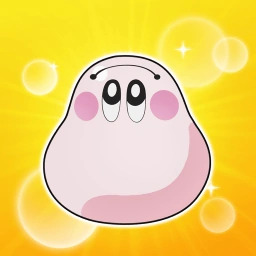
(PEN)NAME: I mainly go by Jassi - some people call me Jas. I’m cool with whatever you want to call me, so long as it’s not rude.
PRONOUNS: I’m okay with people either referring to me as she/her or they/them.
ZODIAC SIGN: Sagittarius/Scorpio cusp.
TAKEN OR SINGLE: Single and cool with it! What matters most to me is finding contentment with myself. I’m in no rush to get into a relationship but I’m also the type of person to go with the flow. Things can change in an instant but I’m happy with how things are right now.
——— THREE FACTS !
I used to do group RP’s primarily on Tumblr - I don’t even know if they’re really a thing anymore but in my early days, it was pretty fun and I met some cool people.
Among some of my jobs have been a call center, a pet store, a kindergarten class room, a retail store and a filing job. My current two jobs are grocery and working at a movie theater. I hope to someday work at a bookstore.
My favorite candies of all time are those little sour watermelons. Can’t get enough of those. I can’t stand those little Werthers candies - they just taste gross to me - I’ve never been big on a lot of ‘caramel’ or ‘butterscotch’ flavors. The only caramel I like is in Caramilk bars and sometimes, I’m in the mood for butterscotch pudding.
——— EXPERIENCE !
PLATFORMS USED: In the past, I used to use Chatzy fairly often which brings back some memories. In my early days, I wrote on Bulbagarden and Habbo Hotel. But right now, my two platforms of choice are mainly Tumblr and Discord.
——— MUSE PREFERENCE !
GENDER: I would say male muses, more often than not - I wish I could point to any one concrete reason, but I just don’t resonate with a lot of female muses. I write maybe one or two on Discord and they’re very infrequent.
LEAST FAVOURITE FACE(S): Dylan Everett - he’s a Canadian actor, who was on shows like Wingin’ It and Degrassi. I don’t really have an issue with Dylan, moreso that one of my more horrible group experiences involved a particularly nasty mun roleplaying as a character that he played on Degrassi. His character on the show was heavily speculated to be gay and canonically had depression. This mun would take these headcanons to extreme, quickly having their muse become extremely attached to any male RP blog that would show them even the slightest hint of attention. To any other muses, especially female ones - they were extremely nasty and had a habit of picking fights. They would often treat other female muses in the group as their ‘love rivals’ and would often initiate threads with these muses, usually under the pretense of them hanging out or studying together, only for the thread to quickly spiral into complete insanity when they would begin threatening these female muses and writing their character holding knives to their throats simply for ‘standing in the way’. OOC, their behavior was also completely wretched and they posted someone’s IP address over a petty dispute over Demi Lovato music. Definitely ruined the faceclaim for me after that.
MULTI OR SINGLE: Single blog for now - I’ve speculated about doing another blog which is still very much a work in progress but I’m trying to take things slow because good things come to those who wait. I’m often reluctant to go multi because I usually know Ryuji will win out and I won’t be able to divide attention evenly between the two.
——— FLUFF / ANGST / SMUT !
FLUFF: I love it - it’s like a warm hug and just what you need on a crappy or boring day. I’m always in the mood for fluff.
ANGST: I do love my angst but sometimes angst that’s especially on the heavier side can be difficult for me to focus on. You ever just get a little too much angst to the point where you want to write happy things instead? That’s me sometimes. Angst is amazing but you have to be in the right mood or headspace for it.
SMUT: I’ve mentioned before that I’m okay with ‘fade to blacks’ or explicitly mentioning our muses have/had a sexual relationship. Someone made a good point about focusing on the intimacy and the romance as opposed to just writing porn for the sake of the porn and I agree with that.
PLOT / MEMES: Definitely plot OOC but I can wing it as well. I feel perfectly comfortable with sending people memes and initiating things via memes, though after a certain point, I do hope that will be reciprocated to some degree. I’m also more than okay with receiving memes - ecstatic even! I’m grateful to every person who sends a meme.
TAGGED BY: @more-than-a-princess (Thanks!)
TAGGING: Honestly, whoever wants to try this! This was a really interesting questionnaire and I hope you were able to learn a thing or two about me! Now, I can’t wait to learn about you!
14 notes
·
View notes
Text



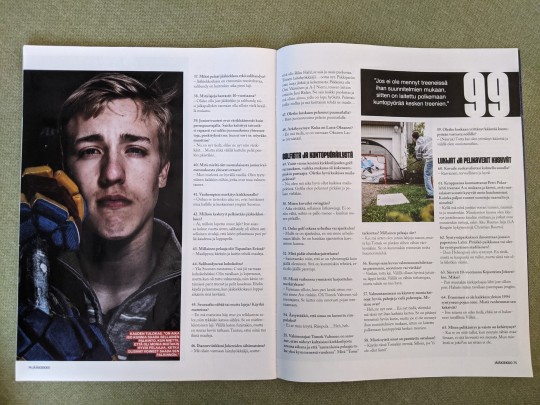
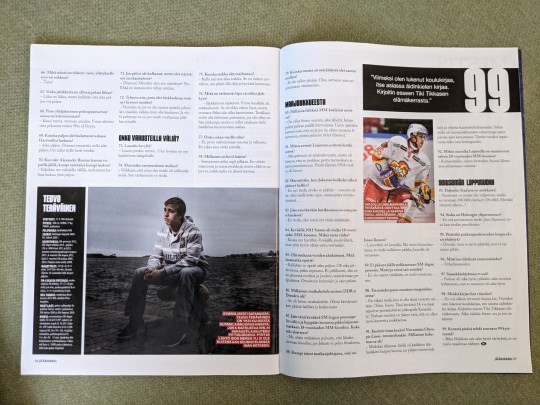
I went thru my folder with old hockey magazines I had saved from around 2011 to 2015 and came across this one and thought it could be a fun to make a post about now in hindsight.
This is Jääkiekko magazine from May 2012, they always have a section of "99 questions with ..." and in this issue they interviewed Teräväinen.
I’ve translated the questions I found interesting under the cut! It ended up being about half of the interview. (*) are my additions.
On the cover "seuraava superjokeri" means the next super joker, he played for Helsingin Jokerit so it's a word play from that. Under, on the blue print it says: "The 17-year-old forward will become a first round draft pick in the summer. The natural goal scorer can dominate in SM-Liiga as soon as next season."
In the 2nd photo the headline and lead paragraph goes:
"A post with dents* - A year ago Teuvo Teräväinen was known only within a small number of hockey insiders. Few passers-by recognize him now either but after a flashy rookie season the Jokerit sensation is on the radar of every NHL team and is a strong contender to become a first round draft pick. Next season with Jokerit the talented second line center will be one of the main talking points in the SM-Liiga."
(*references the net Teräväinen had in his backyard and into which he practiced his shooting)
3. You've been described as a magician, top scorer, wunderkind and a prodigy. What do you think of these descriptions?
TT: Heh, those are some descriptions yeah. What can I really say? Don't really wanna comment on them much.
4. How nervous are you about the Draft?
TT: I try not to be nervous as best as I can. In a way I don't have anything to be nervous about since I don't care which team picks me or at what number I go.
6. Which is stressing you more, English interviews or physical tests?
TT: Maybe both. Bench press (laughs) and English interviews can be tough.
12. How far along have you planned your career with, for example, your parents or your agent?
TT: Haven't really planned things with others but I've thought about them myself. I try to go step by step and not jump too far ahead.
14. How does it feel to be so young with all the star players in Jokerit?
TT: How to say it? I haven't felt like I was young but a part of the team instead. The team's been very good with me and they haven't been looking down at me like: "oh he's young". It's been fun to play in an experienced team.
15. Is there a generational gap between players?
TT: You can see the age difference, older players look older but we're all childish, at least with our topics.
17. What does a 17-year-old do in the sauna nights of the team?
TT: I actually haven't been in any yet. I've always been at national team's camps or something.
19. Did you get the number you wanted?
TT: I did, yeah. I could've taken #18 but Semir (Ben-Amor) has it. But i'm happy with #86, it's good.
23. What are your strengths as a player?
TT: Offensive play and with that playing with the puck, passing, IQ, power play and skill, just the usual skill - skill with hands.
24. And weaknesses?
TT: They are to do with defensive play, strength and physicality. Battles and such but I think I took a step forward last season. That's a good thing.
25. Have you ever been "pressed into a mold" or has your playing style gotten to develop naturally?
TT: As a kid the play was mostly offensive/attacking, I didn't have to think about playing defence. Up until 15 years old, I got to attack pretty freely. Playing defence became more important when I started to play in A-juniors a couple seasons ago.
26. On a scale from 1 to 10 how determined are you?
TT: Maybe 8, feels like an 8.
32. What kind of role are you planning to take with Jokerit next season?
TT: I think a pretty big one. I try to be a top player and not just take others' example but give others example myself too. So that someone in the team can take something out of the way I do things on the ice and off the ice.
35. If you could pick anyone, who would be your car driver?
TT: Nico Manelius for sure. He's been my driver this season. I've had others too, like Riku Hahl but he's not nearly at the same level. Nico’s clearly the best.
36. What are the most important qualifications to be a good driver?
TT: The car is obviously important. Hahl's car is totally awful, he takes a lot of heat for it from the guys too. I wouldn't dare driving with him. Manelius is a steady performer, never lets you down.
38. What sports did you play as a 10-year-old?
TT: Hockey and floorball, probably football (soccer) during the summers at the time too.
42. When did you decide to focus only on hockey?
TT: So when I stopped playing other sports? Three years ago, before that floorball was kind of a side thing, I played a couple of games in the regular season and playoffs.
45. Do you follow floorball or other sports? Go to games?
TT: I don't go to games but I like to watch floorball on TV, it's an interesting sport. Sometimes I watch football too but I don't follow it much. Feels like they never score there.
47. Have you ever played with a wooden stick?
TT: As a kid I did play with a wooden stick.
49. You won the hockey players' golf tournament last summer even though there were more experienced players too. Are you good with all stick games?
TT: Well, I've been pretty good in all of them. I've played golf for a long time and still play it.
50. How is your swing?
TT: Pretty bold, kind of a hockey swing. I don't really care where the ball goes - as long as it goes far.
52. What do you think of off-ice training?
TT: Let's just say it's more stupid than being on the ice but you still gotta do it to be better on the ice.
56. Which word describes your professional relationship (with his coach, Tomek Valtonen), tranquil or colorful?
TT: Colorful of course. At times we're joking around, other times it's more serious but the relationship is really good.
57. Coaching you has been described in many words: good, bad, worse. What are they?
TT: Heh, well... I won't tell them here. He (Tomek) keeps the discipline during practices but sometimes when things haven't gone to a plan I've had to jump on an exercise bike in the middle of a practice.
58. What have been the reasons?
TT: I'll quote Tomek: "when I haven't been present".
59. Have you ever tried to turn the resistance of the bike to zero?
TT: (Laughs) Of course I have and sometimes I've even succeeded.
60. Describe your diet in three words?
TT: Greasy, healthy and good!
64. Your first name is not common for people your age. How did your parents come up with it?
TT: I actually don't even know. Maybe they didn't want a usual Ville*....
(*very common name for men of all ages in Finland)
66. Which of these is the most important: skill, unexpectedness or courage?
TT: Skill!
68. Your longest video game stint?
TT: Six hours, at least. I've played a lot of War of Duty lately.
72. The dumbest thing that has made you upset in hockey?
TT: Probably if I didn't get an assist on a goal even though I should have. Or even worse is if I score and they mark it down for someone else.
79. Have you had any concussions?
TT: I haven't had any, I've managed to always dodge them.*
(*ouch, tho it's good the recent one is his only as far as i remember)
84. In 2011 Team Finland finished in the 5th place at the U-18 tournament. Why only as 5th?
TT: Because we lost to Team Russia in the quarter final, just as well we could have won that game too.
89. You didn't get to be on the ice to accept the SM-Liiga bronze medal (because of the U-18's). When and where did you get it?
TT: I actually still haven't received it, I don't know where it is.
93. What is the population of Helsinki?
TT: There's like 5 million people in Finland so maybe around 500k in Helsinki? (to be exact 596k) Did i really get it right...?
94. Who's the mayor of Helsinki?
TT: I don't know, I barely know the president.
95. Do you think the municipalities in the capital city area should merge?
TT: Luckily I don't have to decide but they probably shouldn't.
96. What do you check first in the news paper?
TT: The sports section.
97. Your favorite tv show?
TT: Putous* was pretty good, I liked a lot of the characters. The grandma was pretty good.
(*Finnish live improvisation comedy/sketch show (there are still new seasons, the latest just finished). Every actor comes up with a humor character with a catchy phrase and one of them wins. "The grandma" is Marja Tyrni and I just got such flashbacks from typing this sentence.)
98. Last book you read?
TT: I don't read many books. The last book was a study book, a Finnish book. I wrote an essay on Tiki (Esa) Tikkanen's biography. An eventful book, great career and a lot of chirps.
99. Who should we ask the 99 questions next?
TT: Riku Hahl could have good stories, he's also seen a lot of the world.
#teuvo teräväinen#teuvo teravainen#carolina hurricanes#canes#hockey#nhl#mp#i knew i had this mag but i thought it was from 2014 and post draft#i really didn't rmbr i've been following turbo for this many years???#good on 16yo me for spending 8 euros on this tho that was excellent thinking
85 notes
·
View notes
Note
hello! could you talk a bit more about the original (as in jp, not localization) ouma's personality and speech patterns? you've mentioned that he tends to trail off or speak more softly when it is implied he is speaking the truth, etc. and how he is not so loud/intentionally obnoxious. //btw when does he call himself a fairy? that's so cute

I got a couple of questions asking about the fairy line Ouma has, so I don’t mind sort of rolling them both into one! And I’m more than happy to talk a little more in-depth about Ouma’s speech patterns and personality in the original game, too!
Since I’ll be covering some late-game spoilers, I’ll put the bulk of this under the cut, so be careful when reading!
First off, I cannot stress how much I recommed playing ndrv3 with the Japanese voices enabled. If you’ve already played through the English dub but never experiened the original voice acting cast, I promise you won’t be disappointed. The Japanese cast are all fantastic, incredibly talented VAs who, unlike the dub, were hired specifically for these roles and not just re-casted from previous DR games.
Hiro Shimono as Ouma gives an absolutely incredible performance. The localization might still have many flaws in its translation and omission of certain lines or punctuation, but you can still very much get a feel for how Ouma’s character was intended by listening to Shimono’s performance. Re-playing the game with the Japanese voices will definitely let you hear how soft and tonally different Shimono’s performance is in places from the English dub, and compare it to the way in which many lines are written and punctuated as if Ouma’s yelling at everyone.
That isn’t to say that Shimono’s Ouma is never loud or excited: Ouma is a character whose moods and façades are all over the place, and therefore his performance requires a voice actor who can similarly change moods and intonation on a dime. Ouma is very much loud and haughty and deliberately annoying when he’s supposed to be, but his voice is also low and ominous at other points when he’s trying to be scary. And again, it’s soft and hesitant in places where he’s considering divulging some of his information, or when he’s insisting that all the things he does are for everyone’s sake, because he cares about them and doesn’t want anyone to die.
These moments feel so much more genuine in the Japanese version of the game--because they’re meant to be. As fantastic of a liar as Ouma is, it’s much easier for us, the player, to tell when he’s lying on a re-play, knowing the information from chapters 5 and 6 that we do, and looking at cues like his sprites (often his blank-faced ones) and, yes, his delivery of certain lines.
This probably sounds like me just gushing about what a fantastic voice actor Hiro Shimono is, and in part that’s exactly what it is, but I want to stress that pretty much every single voice actor in the Japanese cast is just as fantastic and that they all do their jobs incredibly well. With all that gushing out of the way, I’ll move on to talking about some of Ouma’s actual speech tics and the way he refers to other characters.
Like most things about him, Ouma’s speech patterns are sort of an interesting mix and even seem a little contradictory at times. He uses the very masculine pronoun “ore” (オレ), but he also refers to nearly everyone (with only a handful of exceptions) by their surnames and the much more childish honorific “-chan” (i.e. “Saihara-chan,” “Akamatsu-chan,” “Amami-chan,” etc.)
The use of “-chan” is very interesting. Honorifics in Japan are extremely complicated and tend to mean different things depending on who is using them. Typically, “-chan” is seen as a very feminine way to refer to someone else, commonly used in close-knit friend groups among school girls.
There are, of course, a few notable exceptions to this however: often times, middle-aged or elderly people will call a child “-chan” regardless of gender, as a way of showing they find them cute and endearing. And sometimes, people will use “-chan” to refer to other things they find cute, such as pets, or even to refer to themselves in a sort of informal, tongue-in-cheek way.
The fact that Ouma uses “-chan” as an honorific to refer to nearly everyone in the game stands out quite a lot: by and large, boys don’t use this term to refer to other boys. Using “-chan” to refer to anyone you’ve just met or don’t know very well is already somewhat frowned upon, but a boy using it to refer to other boys is especially rare. This helps set Ouma’s character up as someone who is both incredibly casual and informal with others (not to mention, you know, quite coded). Considering childishness and lightheartedness are traits Ouma values, and how much emphasis is put on him having “a very innocent, childish streak that’s hard to hate,” it makes sense then that he would talk like this.
Not counting Monokuma and the Monokubs, the only characters who Ouma doesn’t refer to with “-chan” are Gonta and Kiibo, who he simply calls by name. This also says some interesting things about his character.
Gonta is easily the character who Ouma interacts with the most often, as well as the charater he hurts the most in the end. Ouma’s choice to exclude Gonta from his usual way of calling people is, I think, a testament to how much Gonta really wanted to be friends with him, even if their friendship was never exactly on equal footing.
Meanwhile with Kiibo, I feel the choice to exclude him from his usual way of addressing others is indicative of how much Ouma tried to remind himself that Kiibo “wasn’t human,” and therefore how suspicious he found his presence in the killing game. We know Ouma suspected Kiibo and likely even had an inkling of his role as the audience proxy/camera in the game, due to how Kiibo’s picture is one of the only others set aside on his whiteboard besides Saihara’s, with the word “weird” written next to it (he also clearly guessed about the cameras after Gonta’s line in chapter 2, as we see from how he commissioned Miu for the bug-vac).
Ouma clearly enjoys teasing Kiibo a lot, and their banter reads very much like a manzai comedy duo; I feel like Ouma often tried pushing himself to remember that Kiibo “wasn’t human” on purpose in order to not get too attached to him or too distracted from his goal of ending the killing game. I don’t think Ouma’s decision to exclude Kiibo from the way that he very particularly referred to most of the rest of the group was just an accident or a coincidence.
Honorifics aside, Ouma also refers to several characters in interesting ways. He often uses “daisuki na ___-chan” (大好きな) to refer to some of the other characters, a phrase which more or less equates to “my beloved.” He uses this phrase with Saihara more than any other character of the game, but there are a few other instances where he does use it with Amami, Momota, and (if I’m remembering correctly) Kaede. Pretty much every single instance where the localization put, “because I love you” or “because you’re my favorite” whenever Ouma was talking to Saihara was usually a point where he would specifically call him “my beloved Saihara-chan.”
In chapter 4 during the scene where Ouma is alone in the parlor of the VR world, he also specifically, exclusively refers to Saihara as “suki ni natta hito” (好きになった人), literally: “the person I fell in love with.” This line was changed in the localization to, “when there’s a person I like,” which is more or less literally correct--however, the phrase “suki ni natta” is much heavier and more loaded with explicitly romantic implications than “suki” would be on its own, as it’s often used in Japanese love songs and shoujo manga love confessions.
Worth noting in my opinion is the fact that this is the exact same phrasing Maki uses to describe her romantic feelings for Momota. Since Maki’s feelings for Momota are considered canonically confirmed because of this, Ouma’s feelings should be considered equally canon, but a lot of people don’t know this because, well, it’s sort of been lost in translation.
And now, on to the fairy line! Ouma calls himself a fairy in chapter 3, when he pops up in the middle of Saihara and Korekiyo’s discussion of the katana in Korekiyo’s lab. Full of enthusiasm, he decides to touch the sword and examine it for himself; Korekiyo starts to object, but Ouma interrupts and says:
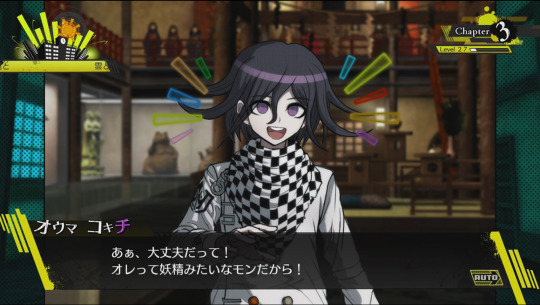
“Come on, it’s not a big deal! I’m like a fairy, so it’ll be fine!”
I’ve always really loved this line and thought it was super adorable, both as a nod to how fairies aren’t supposed to be able to touch steel in most fae mythos, as well as the fact that fairies tend to also have a love for mischief and pranks and lies. The localization apparently didn’t like it so much though, because this line is simply changed to, “Come on, would I lie to you?” instead.
One final thing I can think of as far as Ouma’s speech tics go is that his laugh in Japanese is romanized as “nishishi” instead of “neeheehee,” as this is closer to the Japanese onomatopoeia for the sound horses make--but I actually don’t mind this localization change at all! “Neeheehee” definitely looks a lot closer to the word “neigh” and helps capture that horse joke in a way that I feel like western players can more easily understand.
All in all, while I still definitely feel people can like and enjoy Ouma’s character from playing the localization alone, I still stand by my opinion that listening to the original Japanese voices helps give a much better picture of how the character was intended to come across, and really shows how much depth Hiro Shimono put into his performance. He’s quoted in the official ndrv3 artbook as saying that he believes Ouma is someone who’s actually “really meek if you take away his strong wish to outwit everyone” (credit to @kaibutsushidousha for the art book translation), and I think this interpretation of Ouma really shows through in so many of his lines.
Thank you both for the really fun questions! I hope I could provide some more interesting information about Ouma and the translation!
300 notes
·
View notes
Text
Significance of “Madness” in anime
We’ve already established in other posts about significant emotions and concepts in anime or specific media before. The Significance of losing or the one of visuals and metaphors in Haikyuu!! are some of those I would love to mention here, but today we shall delve into a broader topic that goes more along the lines of Makii’s thrilling post about Danganronpa and the Significance of Despair.
Today, our topic of interest is madness.
To ease your mind, in this post we will be talking about the representation of insanity and madness in some anime characters and how that reflects on the story and ourselves as an audience.To make one thing clear, a lot of the times we see overexaggerated versions of unstable characteristics in anime that aren’t realistic.
This is in no way a discussion about actual mental illnesses and not a professional approach to analysing them to our real life standards, but maybe a start to an interesting discussion about how we portray and handle what one may colloquially call “craziness”.
Now that we’ve got that out of the way, let’s start!
Artists, and no matter for example if they write or draw, use their platforms to deliver messages in cryptic ways. As humans, we have the innate ability to look at something and consume the facts through entertainment which makes us crave new media to follow and analyse.
We love to question things instead of just taking them as they are, and that is why most writers out there will play around with the perception of their audience.
You may be familiar with the common question that ghosts through your head as you enjoy the latest episode of your favorite anime.
Why did he do that? Is she a traitor? What makes them think that way?
Although one might always do it consciously, we most definitely analyse whatever media we consume and decide for ourselves if it is important enough to keep in mind for future reference.
What the writer or founder of the anime ultimately wants from the reader is a reaction.
No matter what they intend to do with it, if they enjoy the viewer getting excited or traumatised is not of importance, but a reaction is evidently one of the goals.
And as strong emotions always evoke an even stronger reaction, anime characters are often very idealized and have ideologies that make them want to do one particular thing.
Be it save the world or destroy it, we focus and look at these characters and root for them if they give us a reason to do so.
Both sides of good and bad can have deeply rooted admiration drawn out of us, and it sometimes doesn’t even matter because the more interesting part is the lovely grey area in between.
We need a balance of good and bad to enjoy both.
Empathy makes us viewers want to relate to the characters, and if the author gives us the possibility to learn why someone does something, it gets harder and harder to dislike them. That’s why tragic backstories and flashbacks are such an overused tool in anime, because with the extreme behaviour some characters show they also need equal amounts of redemption.
We attach ourselves emotionally to characters depending on our personal tastes as well.
If someone likes and relates to a strong and independent protagonist who would drop anything for the sake of justice, you will find a lot of resembling characters in shounen for example.
On the other hand, if a darker or more obsessive character manages to take over a special place in a viewer’s heart, putting them on a pedestal gets more and more interesting, because you’re not supposed to.
Contrary to that, characters with insane or dark personality traits are often very popular, again tracing this back to human instinct of emphasising with wronged characters and curiously inspecting the fully deranged ones.
As this isn't something that should be put into vague concepts, we’re instead going to look at examples of characters and entities that are seen as ‘mad’ and how they’re interpreted.
It’s not just about villains being unreasonably immoral in this post, as we look into what madness entails and how it's shown, we also have some examples of corruption to look at.
So of course there are the typical evil-thinking evil-doing villains out there.
Some of them have an actual backstory to make them more realistic and believable, some others are just pure evil. While they are often called mad for their actions to achieve their goal, the reason why they are put into that light is the stark contrast between the protagonist and the villain.
If the protagonist loves to save people and always has a smile on his face, of course he will differ from his counterpart when he finds out that his methods are a bit more vicious.
The protagonist perceives the villain as insane most of the time, but what does the viewer think?
We seek to look not only at characters that are enjoyable to watch, but also try to find similarities between us and them or draw lines in their behavior to understand them better. As mentioned before, empathy plays a huge role here as well, since whatever happens in anime doesn't have actual repercussions, we can forgive characters more easily.
For example when they are taken by Insanity as a side effect rather than being insane due to trauma, we often get an 'ally turned traitor' trope through hypnosis or brainwashing, which is just as interesting to look at.
If a person did something horrible under the influence of something they had no control over, are they still to blame?
Does Insanity only involve a separate entity that comes from evil, or are we also looking at the gradual descent into darkness when life just isn't the same anymore?
Insane and with no fear: Soul Eater

A great example of how insanity plays with characters be they good or bad is Soul Eater.
With a premise that one needs a sound mind and body to inhibit a sound soul, we obviously know that people close to becoming Kishin-eggs will have a rotten soul drenched in bad deeds, but what about the good guys?
In this instance we have a lot of different types of madness and insanity that touches multiple characters at different times, and by far the most drastic would be the black blood.
The black blood being a synthesized weapon form of blood that can change form and harden into shape, is a weapon made by Medusa and introduced for the first time with Crona. He was melded together with Ragnarök as a weapon and used the black blood in his proficient fighting style.
Soul Eater as well as Maka and other characters later come into contact with the black blood, and the consequence of the immense strength that comes with it is debilitating madness.
As explained in the anime, the madness makes one deny the soul of oneself and others and takes away your fear. Now with no fear present, the person exhibits extremely erratic behavior and is not scared to hurt others or themselves.
This is an insanity that shows how essential a person's fear is, shown by Maka in one of the latest episodes when she fights Asura. The fact that she learned how to accept her own fear and realise that humans need it to survive is why insanity in Soul Eater is merely a concept to differentiate between what is human and what is Kishin.
A Kishin kills and murders with no fear of anything.
A human protects and masters one's own fear.
The power hungry insanity: Hunter x Hunter
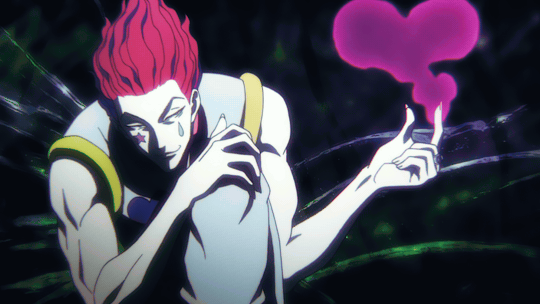
In Hunter x Hunter we have a lot of characters that don't exactly fit the norm of human action.
With people like Chrollo, Illumi and even Chimera Ants there is enough crazy to go around.
Still, the character we shall delve into to look at a different kind of instability is none other than Hisoka Morow.
Yes, in comparison to black blood madness Hisoka is an actual human being with no known influence outside of his own intellect. The contrary to another weapon or entity making someone insane is being shown in this anime.
Hisoka is just insane.
We have no means to see if there is anything that might have caused Hisoka to be the way that he is, but what we do know is that his character is almost too nonchalant for his own good.
His goal is to accumulate power and fight others that he seems worthy, as that is what attracts him. No person is spared if he believes he found a worthy opponent he will make that clear to them and pursue them passionately.
We could rule that the clown is just eccentric, but with the given information from the anime he definitely had some sort of mental difference next to his peers. Harming himself holds no problem to him, and his behavior is deeply rooted only to suit himself. He has no self-preservation except for when he needs to accomplish something, and he even enters the spiders just to get close to Chrollo.
Now we see a single person carry themselves throughout a story only to achieve one thing: a good fight.
After having looked at these two examples of insanity in anime, let's look at how that insanity can be portrayed visually.
A famous way to show someone's psychosis is the “Kubrick stare”. A directorial technique that got named after the director Stanley Kubrick who used a forward tilt of the head with eyes locked onto the camera to show the actors of his movies at their peak of madness. It became a very popular stylistic device and is used still very often in modern movies.
The character is supposed to look menacing, evil-plotting and absolutely unhinged.
Such devices, if used often enough, automatically invoke the message to the viewer.
If you’ve seen the Kubrick stare once in a psychotic character, you will definitely associate it with the same derangement again.
In anime we have a similar thing, and you might be aware of this already.
Familiar with the ‘eye angle just before a character goes insane’ meme?
It’s a running gag that shows multiple characters such as Asura from Soul Eater, Pain from Naruto, Light from Deathnote and Jason from Tokyo Ghoul in a frame where you can only see their eyes and it somehow looks extremely grotesque as if they were looking into different directions with their eyes.
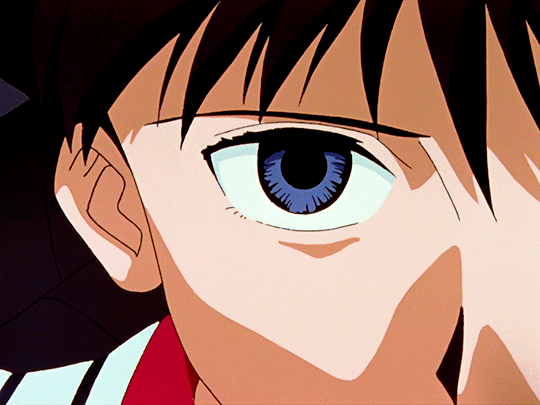
As much as it is a joke, it is a perfect example of something extremely similar to the Kubrick stare used in anime culture. It goes so far that if any anime watcher would see a new character look like in a frame, one would assume they were about to go crazy.
Even Oikawa Tooru from Haikyuu!! was shown with a Kubrick stare in the last moments of the second Seijoh vs. Karasuno game, when his desire to win overtook him with incredible force.
Without loss there naturally can’t be any wins, and without sadness there will be no joy in laughter.
We need the different depictions of what one might call madness, to fill our stories with nuance that relies on our reality.
Be it an unknown entity, hunger for power, lack of fear or the good old fashioned thrive for world domination.
Madness is just another part of what we call life, and to be honest in healthy doses and for effect why not enjoy it in anime?
Now, do you guys know any other characters or concepts in anime that would be worth mentioning? I would love to see them in the comments!
Until then, stay sane!
-Nissa
#nissakii#anime#manga#madness#insane#insanity#psychosis#mental illness#soul eater#maka#crona#medusa#asura#hxh#hunter x hunter#hisoka#chrollo#significance of madness in anime#crazy#kubrick stare
62 notes
·
View notes
Note
"Suggest how you might resolve the staging difficulties inherent in a production of Ibsen’s Peer Gynt." if you get the reference I'd love you forever, but it's not the question for this week. Here it is: If you could change the way any movie/play/book was made, which one would you change? how?
I was looking at other people's responses to this before answering, which sometimes helps me out, and I saw someone talk about queer rep issues, so now I'm gonna rag on Naughty Dog for several paragraphs 🙃
Don't get me wrong! My cat is named after a Crash Bandicoot character (Pura), I have a marquee light in my bedroom that says "no matter what" (one of the last things Joel says to Ellie in the first Last of Us game), I have an Uncharted-inspired jewelry box that I laser-engraved myself, and out of the 3 times I've seen myself in a video game character, 2 of them have been Naughty Dog characters (Coco and Ellie)
But there's a Naughty Dog employee who said that the PS5 remake of The Last of Us is the first game that person has made where they didn't crunch :^) Someone got hospitalised during the making of Part II and someone else had to a rent a second apartment closer to the studio and away from his wife and child while making A Thief's End :^) Game studios need to stop crunching their games, for the love of God. The lives and wellbeing of humans should come before getting your product on store shelves but not everyone can understand that, apparently. This is a very widespread issue in the industry when the problem shouldn't exist at all.
And then here's where the topic of queer characters comes in :^) Yes, it was hilarious seeing homophobes have meltdowns over Ellie's kiss with Riley in the DLC and Ellie's kiss with Dina in the E3 2018 trailer! But a good way I've heard the presence of queer characters in TLOU described is "It doesn't feel like we're being celebrated, it feels like we're just there."
It's good that they wrote the series with the intention of any female characters being interchangeable with any male characters. Joel could've been a single mom before the Outbreak, Tess could've been the one to take Ellie to Salt Lake, Riley could've been Ellie's best friend who happened to be a boy, and Ellie, Sarah, and Abby could've been boys.
I used to feel like Ellie's romances could be interchangeable with M/F couples, but not anymore, not since I played through the flashback scene that the E3 trailer comes from :') The kerfuffle in that scene is caused by Seth calling Dina "another loud-mouthed dyke"... like, does that really have to be the way we demonstrate that Joel is still being a total dad to Ellie even when they aren't on speaking terms? 😖
Let's talk about the Bury Your Gays moment that a lot of people don't even realise is present in the first TLOU game. Bill and Frank were originally written as business partners and the truck scene originally had Ellie making comments specific to women's bodies while flipping through the magazine she stole from Bill. Bill's actor interpreted the term "partner" as romantic and the truck scene was changed for Ellie to comment on men's bodies instead ("How would you even walk around with that thing?!"). Anyone who's played past Bill's Town knows what happened to Frank and Bill.
Lev's entire plot is that he's been chased out of the only community he's ever known for being trans. Yara's entire plot is that she's been chased out of the only community she's ever known for affirming her trans brother. There's, like, nothing else happening for those two. Lev is trans, Yara can't bring herself to reject him, and they fuel Abby's redemption arc. That's it. A lot of people didn't like that when you encounter cult members, they deadname Lev... we don't need to know what his birth name was and it's enabled certain let's players 👀 to be transphobic about Lev.
Ellie has 3 known romances through the series. The first one ends with an ambiguous fate for Riley, either she turned or she died. The second one doesn't play much of a role and is pretty much only there to be mentioned to explain Ellie being able to get a tattoo in the apocalypse. The third doesn't end with anyone dying or turning, but still is not a happy ending. Our lesbian protagonist doesn't seem capable of getting a happily-ever-after.
And I get it! I'm not stupid! It's the zombie apocalypse! You don't always get to be happy when there's soldiers and hunters and rattlers and infected all after you! But it's REAL fucking suspicious that Naughty Dog's only franchise with canon queer characters is also their most tragic franchise 🤔 The official Naughty Dog Twitter retweets Chlodine (Chloe Frazier/Nadine Ross) fanart despite all of Naughty Dog's ACTUAL queer rep being jammed into an M-rated franchise about mushroom zombies, a creepy religious cult, and a cannibalistic pedophile, which feels reminiscent of the Avatar creators fighting just for Korra and Asami to HOLD HANDS in the FINAL EPISODE and then Nickelodeon, years later, making official YouTube compilations of "Korra and Asami's most romantic moments"
And Part II just went on for so fucking long. I feel like it was partially so they could flex about making their biggest game yet. I was getting so worn out and probably didn't feel how the studio wanted me to feel when I finally finished it.
So if I could change things, it would go like this:
If I could retroactively make their other games not be made under crunch, then I would
Cut down the size of Part II, it doesn't need to be that long and possibly could have gotten across the same ideas as a single-disc game
Scrap Seth's homophobia
Give Yara and Lev something to be other than just characters whose plot revolves around being trans
Eliminate Lev's deadname, we don't need it
Don't necessarily have to get rid of the Bury Your Gays in TLOU, since that's the nature of that world, but at least put some queers in the other games
Chaotic bisexual Nathan Drake (that's just the vibe I get from him)
Lesbian Coco Bandicoot (she doesn't specifically have to be gay, but she's definitely WLW of some kind because no straight woman has a cat but no boyfriend)
Maybe even canon Chlodine, who knows
2 notes
·
View notes
Text
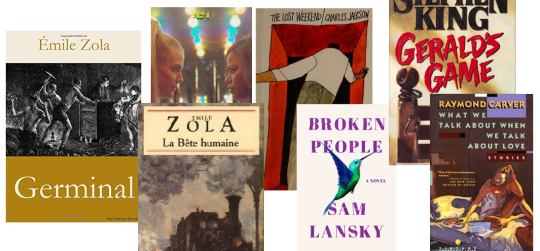
hello join me in thinking about some books and authors that are, or might be, part of s5′s intertextuality
5.10 in particular offered specific shout outs, and also u know i’m always wondering what might be ahead so i have some ideas on that:
- first, as mentioned in a previous ask post, i know i wasn’t alone in keeping an eye out for 5.10 parallels to the lost weekend (1945) the film that gave episode 1.10 its name and several themes - or to the 1944 book by charles r jackson which the film is based on
- s5 has not been shy about revisiting earlier seasons, especially s1. altho i feel that 1.10′s parallels to the lost weekend centered characters other than jughead (mostly betty), a 1.10-5.10 connection involving jughead and themes from jackson’s story (addiction, writers block, self reflection) seemed v possible if not inevitable
- but like,, , for a hot minute after the ep, i was really stumped on understanding how anything from the book or film could apply, even tho the pieces were almost all there
- jackson’s protagonist don birnam goes thru and comes out the other side of a harrowing days-long drinking binge that could be compared to jughead’s one-night hallucinogenic writing retreat
- but jughead is struggling primarily with traumatic memories, not addiction and self control like birnam. and tho drinking activates birnam’s creativity, it paralyzes his writing as he gets lost in fantasies; he’s never published anything. jughead’s drug trip recreates circumstances that already helped him write one successful book. even the rat that startles him mid-high doesn’t line up with birnam’s withdrawal vision of a dying mouse, symbolic of his horror at his own self-destruction thru alcohol
- and maybe the most visible discordance: in the film there’s a romantic motif around a typewriter. first it’s an object of shame; birnam’s failure to write, tied up with his drinking, makes him flee his relationship. he tries to pawn the typewriter for booze money and finally a gun when shooting himself feels easier than getting sober. but with the help of relentless encouragement from girlfriend helen, he quits drinking, commits to her, and focuses on typing out the story he’s dreamt of writing. rd goes so far to avoid setting any comparable scenario that jughead has brought a wholeass printer into the bunker so there can still be a physical manuscript to cover in blood by the end, even without his own typewriter. the subtle detail of his laptop bg image is a little less noticeable than his avoidance of betty’s gift
- tabitha might be closer to a parallel than jughead is, but she’s still no helen. both refuse to take advantage of the inebriated men in their care, but birnam takes advantage of helen, financially and emotionally. jughead refused a loan from the tate family and now has resolved to deal with his shit before he considers a relationship with tabitha. instead of helen’s relentless and unwelcomed attempts to get birnam sober, tabitha reluctantly agrees to help jughead trip safely bondage escape notwithstanding. she even helps him get the drugs.
- whatever potentials exist for parallels to jackson’s story, they were not explored for this episode. ok so why tf am i even talking about this? what was there instead?
- i have arrived at the point
- s5 has been revisiting s1, not directly but with a twist. and jughead’s agent samm pansky is back. u may recall, pansky is named for sam lansky
- jughead’s trip-thru-trauma is a story device tapped straight from lansky’s book ‘broken people’
- lansky is like if a millenial john rechy wrote extremely LA-flavored meta but just about himself no jk very like a modern successor to charles r jackson. both play with the boundary between memoir and fiction. lansky is gay; jackson wrote his lost weekend counterpart as closeted and remained closeted himself until only a few years before his death. both write with emotional clarity and self-scrutiny on the experiences of addiction, sobriety, and the surrounding issues of shame and self worth
- i feel like a fool bc after this ep i had been thinking about de quincey and his early writings on addiction (c.1800s), but i failed to carry the thought in the other direction, to contemporary writers in the genre, to make this connection sooner
- lansky’s second book, broken people, follows narrator ‘sam’, mid-20s, super depressed, hastled by his agent to write a decent follow-up to his first book, but too busy struggling with his self-worth and baggage from several past relationships. desperate, he takes up an offer to visit a new age shaman who promises to fix everything wrong with him in a matter of days. not to over simplify it but he literally spends a weekend doing psychedelics and hallucinating about his exes. jughead took note
- unless u want me to hurl myself into yet another dissertation about queer jughead, i think his parallel to sam - who, unlike jughead, has considerable financial privilege and whose anxieties center on body dysmorphia, hiv scares, and his own self-centeredness - pretty much ends there
- But,, the gist of the book could not be more harmonius with a major theme shared by the 2 films that inform the actual hallucination part of jughead’s bunker scene: mentally reframing past relationships to get closure + confronting trauma head-on in order to move forward
- so that’s neat. what other book and author stuff was in 5.10?
- stephen king and raymond carver get name dropped. i’m passingly familiar with them both but u bet i just skimmed their wiki bios in case anything relevant jumped out
- like jughead, carver was a student (later a lecturer) at the iowa writers workshop. also the son of an alcoholic and one himself
- i recall carver’s ‘what we talk about when we talk about love’ is what jughead was reading in 2.14 ‘the hills have eyes’ after he finds out about the first time betty kissed archie (at that time he does not respond as would any of carver’s characters)
- this collection of carver stories deals especially with infidelity, failings of communication, and the complexities and destructiveness of love. to unashamedly quote the resource that is course hero, ‘carver renders love as an experience that is inherently violent bc it produces psychic and emotional wounds.’ very fun to wonder about the significance of this collection within the s2 episode and in jughead’s thoughts. and maybe now in the context of the s5 state of relationships. or, at least, the state of jughead’s writing as seen by his agent
- anyway pansky doesn’t want carver, he wants stephen king
- i have too much to say about gerald’s game in 5.10, that’s getting its own post someday soon
- lol wait king’s wife is named tabitha uhhh king’s wiki reminded me of his childhood experience that possibly inspired his short story ‘the body’ (+1986 movie ‘stand by me’) when he ‘apparently witnessed one of his friends being struck and killed by a train tho he has no memory of the event’
- no mention of that in this rd episode but memories of a train could be interesting to consider with the imagery that intrudes on jughead’s hallucination. i still feel like it was a truck but the lights and sounds he experiences may be a train
- ok now we’re in the speculation part of today’s segment
- if jughead’s traumatic memory involves trains, then it’s possible this plot will take influence from la bête humaine <- this 1938 movie is based on the 1890 novel by french writer émile zola. this story deals with alcoholism and possessive jealousy in relationships, sometimes leading to murder. huh, kind of like carver. zola def comes down on the nature side of the nature-vs-nuture bad seed question (tho i should say he approaches this with great or maybe just v french compassion). also i can’t tell if this is me reaching but, something about la bête humaine reminds me of king’s ‘secret window’ which we’ve observed to be at least a style influence on jughead post time jump
- but wow a late-19th century french writer would be a random thing to drop into this season, right? then again zola also wrote about miners, which we’ve learned are an important part of this town’s history + whatever hiram is up to this time. and most notably, zola wrote ‘j’accuse...!’ an open letter in defense of a soldier falsely accused and unlawfully jailed for treason: alfred dreyfus. archie’s recent army trouble comes to mind.
- since the introduction of old man dreyfuss (plausibly Just a nod to close encounters actor richard dreyfuss, but also when is anything in this show Just one thing) i’ve been wondering if these little things could add up to a season-long reference to zola’s writings. but i had doubts and didn’t want to speak on it too soon bc, u know, it’s weird but is it weird enough for riverdale??
- however,,,
- (come on, u knew where i was going with this)
- a24′s film zola just came out. absolutely no relation to the french writer, it’s not based on a book but an insane and explicit twitter thread by aziah ‘zola’ wells about stripping and? human trafficking?? this feels ripe for rd even outside the potentials here for the lonely highway/missing girls plot.
- that would add up to a combination of homage that feels natural to this show
- anyway pls understand i’m just having fun speculating, most of this is based on nothing more concrete than the torturous mental tendril ras has hooked into my skull pls let go ras pls let go
#accompanying image has no meaningful organization it's just there to make me look insane. enjoy#riverdale speculation#filmref#but books#adhd has me like. this is Not the post i've been trying to write for weeks but my brain gave me no choice
20 notes
·
View notes
Text
Everything we know about Aaravos
This includes stuff from the books, interviews and ComicCon, so spoilers. Updated with a few things from the artbook. I’ll try to keep updating when I come across new info.
Timeline

From Book 1: Moon
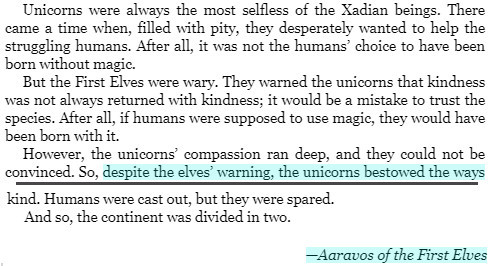


Callum’s Spellbook
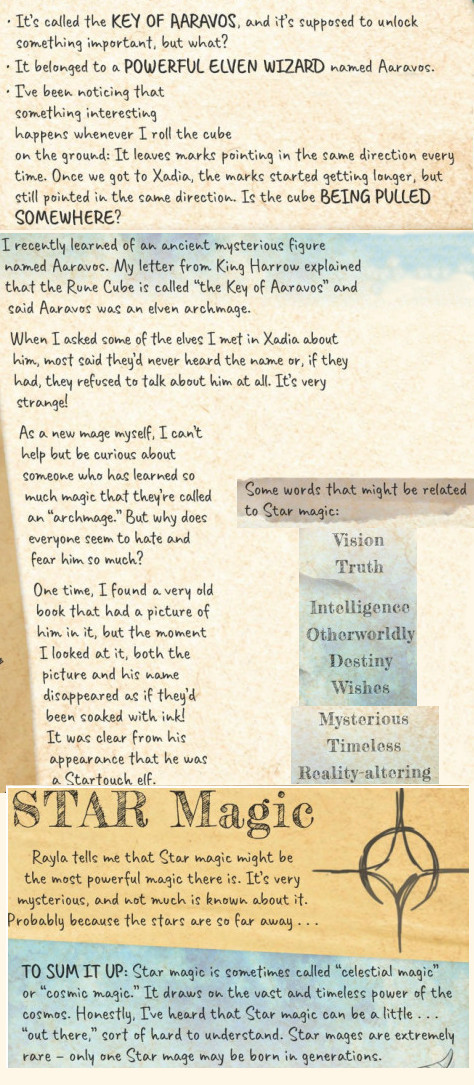
Historical texts
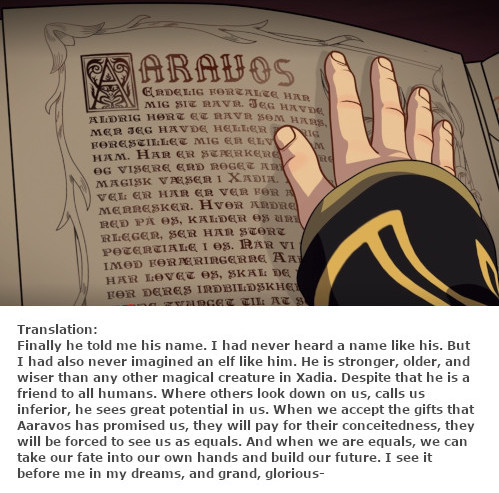
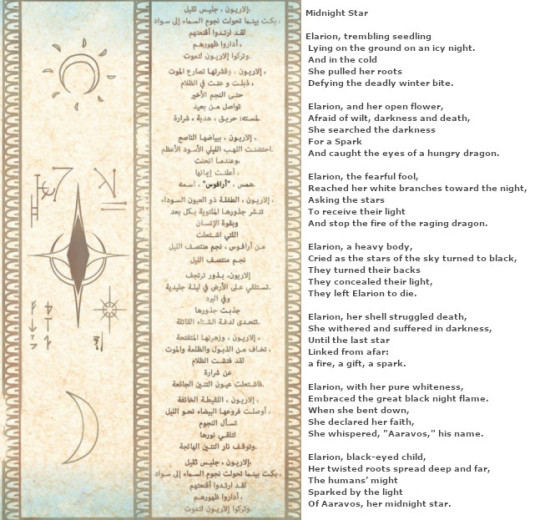
The Art of the Dragon Prince
And a third page written in Italian was added to the historical texts.
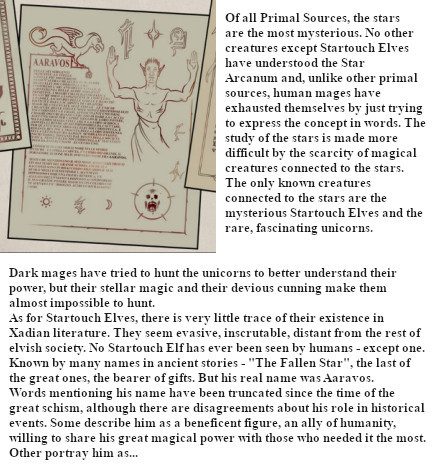
“Last of the Great Ones” is interesting, because Zaird says to Sol Regem his staff was a gift from one of the Great Ones. Sol Regem is alarmed but doesn’t immediately know who Zaird is talking about. So apparently between that conversation and when this text was written all Great Ones except for Aaravos died, and even he ‘fell’.
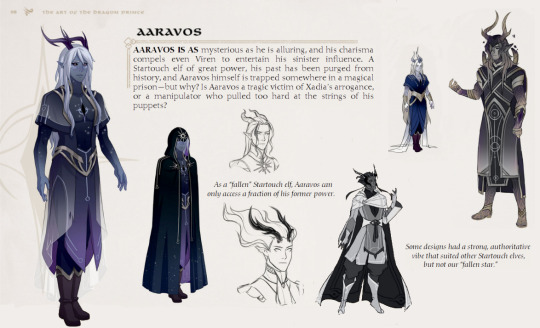
Also this note about Aaravos not being at full power.
As a ‘fallen’ Startouch elf Aaravos can only access a fraction of his former power.
The spell Zaird used to absorb the sunbirds to create the fireball he used against Sol Regem and the spell that Aaravos casts for Viren to absorb Zym’s power are meant to resemble each other in their swirling vortex. The symbol for Dark Magic also has a swirl in it around a diamond shaped like the one on Aaravos’ chest. This absorption vortex seems to be pretty central to Dark Magic, and it only seems it can be done with the staff Aaravos most likely crafted.
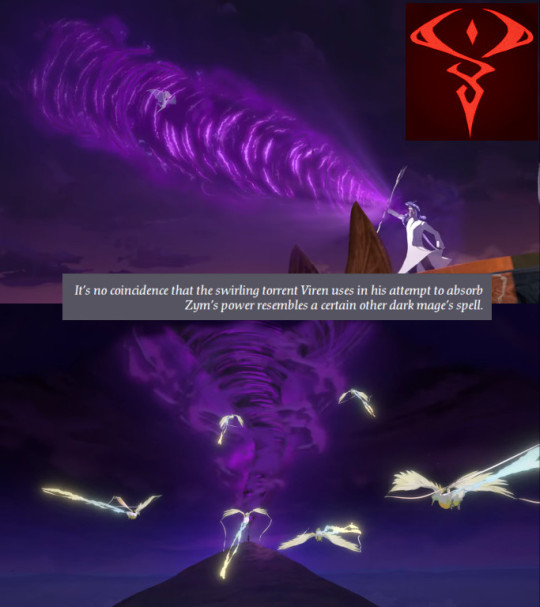
The Show
Zaird staff is the same staff Viren uses. Aaravos recognized it. Given the historical text Aaravos is the “Great One” who gifted Zaird that staff.
Transcripts of all his lines in this post.
Aaravos is the narrator in the opening.
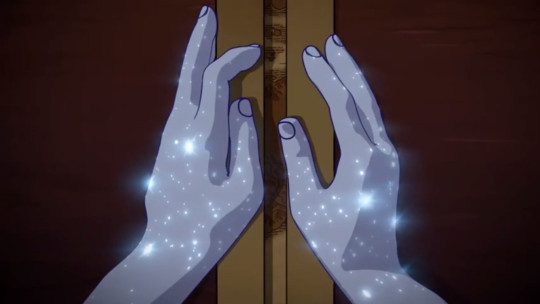
First appearance in S1 from the first war between humans and elves & dragons 1000 years ago.

Elves don’t seem to ride horses, but big cats, dogs, lizards, etc instead. Yet Aaravos choose to depict himself riding a star primal horse (He could make Viren see any creature he wanted). Considering it turns out that unicorns and Startouch elves are the only two star primal creatures humans know about, is he just being dramatic or does this have a deeper meaning?
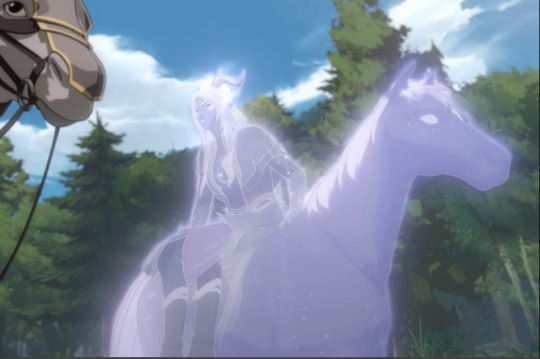
Mirror in the Dragon King’s lair.

Cocoon
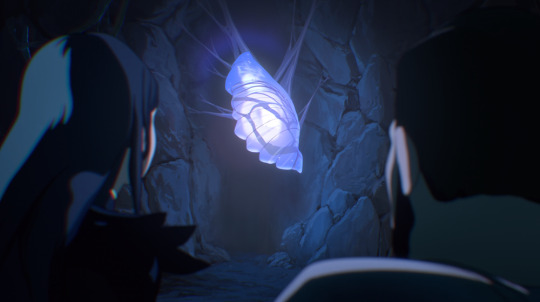
Dragon Prince Website
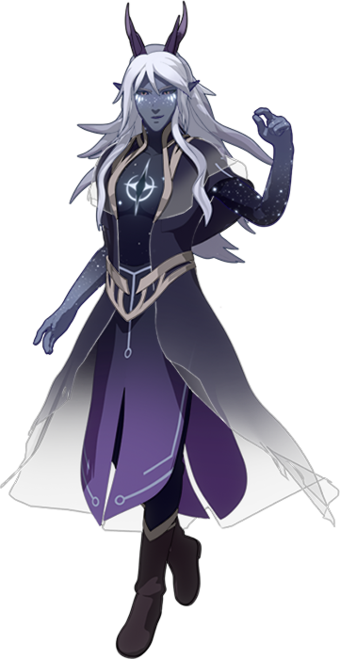
Bio;
Mysterious and charismatic, Aaravos is a rare kind of elf few have ever seen. He is secretive yet charming, and even Viren finds himself compelled by Aaravos’ cryptic words and gifts.
Height: 6’6 (6’9 with horns)
Birthday: November 14th
Age: ???
Birthday Vignette;
Aaravos does not count the passage of time in minutes, nor hours, not even days — he counts candles, one after the other, burning themselves down to the wick and a puddle of hot wax. He would run out of candles if it weren’t so easy to reform them with a wave of his hand, as though the burn had never happened.
He thinks sometimes about the way humans count their years: one day every year marks a precious point in their short life spans. They celebrate. They feast. He thinks that if he cared for the idea, he’d like to remember the taste of a smooth red fruit a human had plucked from a tree for him, once.
It had been so crisp, and so sweet.
AMA, Tumblr, Instagram Live
Who are the First Elves?
AE: First Elves are startouch elves, or possibly a subset of startouch elves...
When did the idea of Aaravos come up? How early in the planning of the saga did you guys come up with him?
AE: Justin and I came up with Aaravos very very early. In the early stages we referred to him as "Mirror Mage." We always knew he would be the secret long-game mystery villain... Aaron
Is the Key of Aaravos actually the key of where he was imprisoned?
AE & JR: We can’t tell you.
JR: We don’t even know. We haven’t even discovered the answer yet.
AE: We know! Actually, that was one of the first things we knew at the very beginning. We’ll get to it.
Did Aaravos create dark magic?
AE: No, it was discovered not created. Did Aaravos turn them onto it or help them discover it? That’s very possible. Whether Aaravos played a role in developing their ability to do dark magic. Exploring the possibilities of dark magic.
How could Avizandum (Thunder) imprison such a powerful creature as Aaravos? Can archdragons do such magic or who helped him?
This required some collaboration between archdragons and elves
Were you surprised by all the thirsty reactions to Aaravos?
Judging from everyone who worked on the show and their reactions, no we weren't surprised :)
Where is Aaravos walking in epsiode 6? And how and where did he a get a horse?
Aaravos can basically make Viren “see” him however he wants, so he chose to appear on the back of a purple horse. There was actually a line in there at one point that we had to cut for time that clarified a bit more heavily -- Viren grumbles at him, “Must you appear... that way?” as Aaravos is floating in the air, and Aaravos replies, “Ah, I can appear more naturally if you’d like,” and then he flips backwards onto the horse as you see in scene in episode 6. :P
which FFXIV classes would the rest of the cast be?
Aaravos - mysterious benevolent ascian
Interviews
There is no Startouch elf society as they’re not numerous enough.
Hot Brown Morning Potion Ep 5
Hypothetically, if Aaravos knew about his own fandom, how would he feel about them?
AE: He takes a special interest in humans, so he would be very pleased that humans appreciate him.
Wondercon 2019 panel Q&A
“The goal of healing and rebuilding the world is going to be a hard one, and especially a hard one when Aaravos, who may have been one of the mysterious forces who pushed the world into this situation, now seems to be on the cusp of returning or trying to return to the world.”
Inverse Season 4 interview
“Practical usable powerful magic, is drawn from the six Primal Sources, but there’s this idea that there’s this kind of earlier, less differentiated power. A kind of magic that’s deeper and more, (I don’t want to kind of say what all of them are). It’s not that important now. It has more to do with the history of beings and interactions and now I feel like I’m talking crazy, but Aaravos cares about some of this stuff and it’s funny, people have worked on a speech in season 5 where he kind of goes into some of this.”
...
“I think he’s complicated. I mean it’s, I think there’s a part of him that is kind, that is generous, that is giving and I think there’s a part of him that is arrogant and desiring to be, you know, worshipped and revered...
He never lies, I don’t know if he’s never lied about anything, if you understand where he’s coming from, he’s not lying about anything. But you don’t necessarily know where he’s coming from. He never lies, he always tells the truth. You’ve heard us talk about Aaravos before, is it Lucifer or Prometheus, who has a relationship with humanity and the gifts and sharing that he has historically have been, you know, you can interpret it differently.”
...
Q: We know he’s mastered all the primal sources, it that like could all of us do that or just him?
A: He’s very special.
Cartoon Universe Season 3 interview
kn: What’s your favorite Greek myth?
AE: There are so many intriguing myths to choose from – I think if I have to choose I would say the Prometheus myth. The titan stole fire and gave it to humans, elevating them – and was punished by the gods for this. I feel like there are parallels to the biblical story of the serpent tempting Eve to eat the apple, and its effect on humanity… and the comparisons are sort of fascinating.
I am interested in both the mythic/divine messenger who stole/shared these gifts with humanity, and the story of what humans chose to do once they had these gifts.
Korranews interview
Can I just jump back for a minute to the Star elves, can you talk a little bit about them?
Richmond: We can tell you their name, so they’re Startouch elves, is the type of elf they are and kind of no. [Laughs] They’re super, duper rare, they’re very mystical and we have a lot of plans for them, but that’s kind of all I want to give you.
Ehasz: They’re mystical, mysterious - the mystical, mysterious Mr. Aaravos. [Laughs]
Richmond: That’s the spinoff. [Laughs]
Ehasz: Yeah, they are more - I mean, they’re Star Elves and they’re more associated with the heavens and they’re not immortal, but they have more of a time scale that is more like the stars than other elves, so they’re a little bit removed and big picture, but Star Elves have a, I mean, they’re part of mystery and myth and we’re going to meet one this season. I love the actor who plays him is Erik Todd Dellums, who I worked with on Avatar [the Last Airbender] who has an amazing voice and he’s perfect to embody a character like this and we’re excited about this character. We hope the audience is intrigued and ready for more.
Screenrant Season 2 interview
Going back to Aaravos for one second. We’re assuming there’s a reason why he seems to be telling this story — we see his hands at the beginning of each episode in the opening sequence.
AE: Yeah, so he’s a Startouch Elf, and they are closest to the heavens of the elves. They’re kind of the most god-like, in the sense of they span much more time than more Earth-bound or Xadia-bound elves. So yeah, he has this thousand year perspective. This kind of mythic role. So he’s like this mythic character who now, suddenly, is kind of popping up in this contemporary story.
JR: And obviously, he’s bad enough that they tried to literally erase him from the books.
AE: He’s complicated.
JR: He’s interesting enough that they tried to erase him from the books.
AE: He’s disliked. That’s not the same as bad.
Hyperable season 2 interview
“The name of a very important person to Aaravos will be in the map of a novel, but it will be a long time before you know what that means,” Ehasz said. “A lot of his motivation comes from that relationship.”
Hyperable Season 3 interview (Possible names on the map are Skall’s Hook, the Ruins of Elarion, and Mount Kalik).
The team also teased The Orphan Queen, a new story they hope to tell in the series, books or even in a feature film, which follows a young human girl who starts from nothing and grows up without parents. She takes a dangerous journey to Xadia and ends up saving the world. She’s also Ezran’s first royal ancestor. Ehasz and Richmond said the idea was born when they were imagining where the Key of Aaravos comes from.
Ehasz and Richmond also dug into the timeline of Xadia, and how certain eras will impact both the books and the series. Five thousand years ago, Xadia was in its “mythical, Biblical first days,” a time long before elves and dragons were allied in which humans suffered and struggled. The “rise of Elarion” came around 2,000 years before the events of the series, and saw humans find their way to magic.
Around 1200 years ago finds the arch dragon of sun, Sol Regem, as king of the dragons during this era, when dark magic became problematic and humans poached magical creatures for their parts. Shortly after came the division of Xadia.
The next big turning point for the world was 300 years before the series, a time Ehasz and Richmond dub “the era of Avizandum.” Two stories they want to tell take place during this era: The Fallen Star and The Orphan Queen. We don’t know anything about The Fallen Star yet ... but we will. The team noted that history will one day know the modern era as “The Return of Aaravos.”
Polygon season 3 interview
Concept Art
Dorothy Yang’s design 'Fallen Star.’ Check out more of her work on ArtStation.
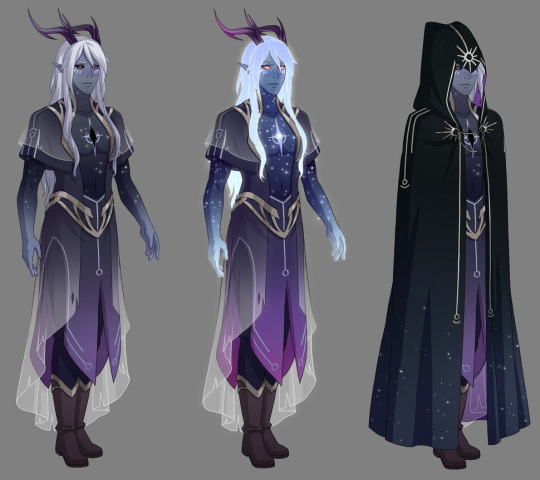
When they were first brainstorming ideas for the show Aaravos had a blindfold, but that was scrapped for being “too on the nose.” This is Giancarlos Volpe’s early sketches that he posted on Twitter.
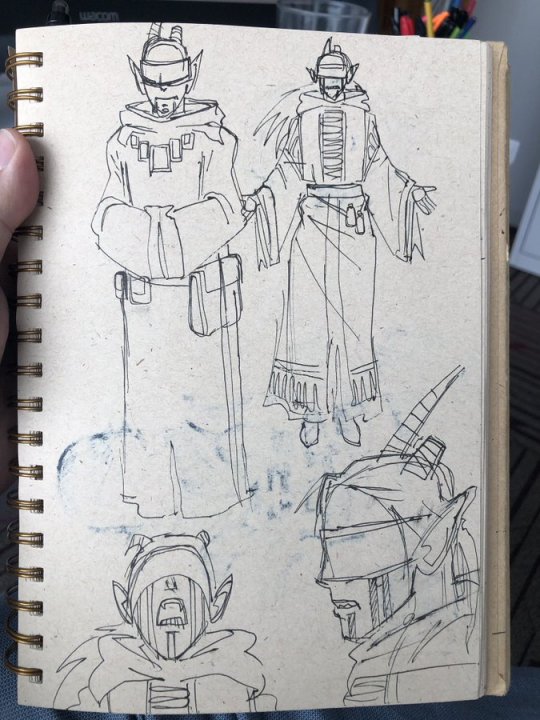
269 notes
·
View notes